

Paris France travel requirements 2024: What American travelers need to know
We aim to keep this post updated about Paris France travel in 2024 with official Paris travel restrictions, requirements, and health and safety guidance. Our goal is to help you make informed decisions so you can travel confidently, safely, and responsibly in this new post-pandemic world of ours.
Paris is a destination close to our hearts, as Michelle has relatives in the city and studied in Paris in college.
As restrictions vary based on the traveler’s citizenship, we will focus primarily on those affecting U.S. citizens.
Last update: January 2024. Originally published: May 2021.
Disclosure: This post contains some affiliate links. If you make a purchase through one of our links, we may receive a small commission, at no additional cost to you.
January 2024 – Agnes Groonwald of Travel on the Reg , expats in France: “Tourism in Paris has seemed light since our move just outside of the city, but we also haven’t experienced the peak summer season yet. It’s still expected to book the big attractions (e.g. Louvre Museum) a few weeks ahead of travel, and dinner reservations remain a must at popular eateries.
Some locals and tourists are still voluntarily masking on crowded public transit and popular tourist destinations. Otherwise, it appears to be business as usual. There are no COVID protocols outside of doctors’ offices where masking is compulsory. Paris attractions, restaurants, and public transit are all operating without COVID-era restrictions. You can travel to/from the city without vaccine cards. That said, the city continues to struggle with regular disruptions to transit/worker shortages that require patience from travelers, but this has more to do with local politics vs. COVID. It’ll be interesting to see what happens during the Olympics.
The general tips for Paris travel apply. Leave plenty of time to get to/from attractions around the city and pre-book the big ticket items as soon as you know when you’re visiting.”
*At the end of the post, we share more on-the-ground perspectives from local residents and travelers to the Paris so you can get a true sense of what to expect.
Table of Contents
Can US citizens travel to Paris, France? Can I travel to Paris right now?
Yes, France is open to American travelers, regardless of vaccination status.
As of August 2022 , France removed all COVID entry requirements for any traveler from any country.
Testing, proof of vaccination, proof of recovery, proof of a compelling reason for travel, and sworn declaration about Covid contact and symptoms are no longer required .
Visitors from over 60 visa-exempt countries , including the U.S., will soon be required to have a European Travel Information and Authorisation System (ETIAS) travel authorization to enter Italy and other European countries . The start date has been delayed from 2024 to 2025.
See details about ETIAS here
Paris, France travel restrictions currently allow traveling between regions. However, as of May 2023 , short-haul domestic flights that can be taken by train in less than two-and-a-half hours are not allowed.
Effective March 2022, masks are no longer required in indoor spaces and public transport but still highly recommended in enclosed and small spaces, in hospitals, and other medical centers.
Quarantine rules in Paris, France: What happens if I get Covid?
Travelers are not required to quarantine upon arrival in France unless presenting symptoms of Covid.
Travelers who test positive for COVID-19 while in France are no longer required to self-isolate but are asked to observe the following guidelines:
- Wear mask, observe physical distancing, practice hand hygiene
- Avoid contact with people who are immunocompromised
- Notify others (family, friends, colleagues) you came in contact with within 48 hours before the onset of symptoms, or within 7 days before testing positive, if no symptoms are present
- Contact a doctor and monitor your health
See details here .
Paris Health Pass/Pass Sanitaire Requirements for Dining, Attractions, and Travel
You might be wondering: Do I need a vaccine certificate or Covid test to enter restaurants, public transit, accommodations, and attractions in Paris?
Since March 2022, a vaccine pass is no longer required to enter most establishments.
As of August 2022, Health Pass or passe sanitaire , obtained with a proof of either vaccination or a recent negative Covid test, is no longer required.
Can Americans travel to Paris France in 2024?
Travel to Paris in May is open for US citizens without restrictions. Please read on for details and check back for updates, as protocols may change.
What is it like to fly to Paris, France CDG Paris Charles de Gaulle Airport right now? As of March 2022, wearing a mask is no longer required in French airports. Check with your individual airline about mask requirements on board the flight.
Temperature checks or other screenings may be done at the airport. Hand sanitizers are readily available.
Do Americans have to quarantine when traveling to Paris, France? No. Travelers are not required to quarantine upon arrival in France.
Does France check COVID-19 symptoms of incoming travelers? Health screening procedures, including temperature checks, may be in place at airports and other ports of entry in France.
Does France require a negative Covid 19 test for American travelers? As of August 2022, a negative Covid 19 test is no longer required for entry.
Does France require a proof of Coronavirus vaccine for American travelers? As of August 2022, a proof of Coronavirus vaccine is no longer required for entry.
Do I still need to provide a negative Covid test or quarantine if I have been vaccinated? No. Quarantine or proof of a negative Covid test are no longer required, regardless of vaccination status.
Is a booster shot required for travel to Paris, France? As of August 2022, booster shots are no longer required for purposes of entry to France. There is currently no expiration period set for the validity of vaccinations.
What Covid testing options are available for travelers in Paris, France? U.S. Citizens can obtain a COVID-19 test at laboratories and testing centers in Paris. Covid-19 testing centers are also available for certain situations in Paris-Charles de Gaulle airport and Paris-Orly by appointment .
PCR tests generally cost between 50 and 100 euros, payable in advance. Results for the PCR test are available within 48 hours. Antigen tests cost 29 euros for those not covered by French social security; results are usually available within half an hour.
Testing centers in France can be found on this map.
What healthcare options are available to travelers in Paris, France who get the virus? Paris, France hospitals and clinics are open. Testing in labs and pharmacies is available to foreign visitors at their own expense.
For travel insurance that covers Covid, check out Nomad Insurance by Safety Wing >
What service businesses and restaurants are open in Paris, France? Restaurants, bars, cafes, museums, parks, clubs, attractions (including the Eiffel Tower), and tours have reopened. Stadiums, arenas and other large-capacity venues are allowed to operate at full capacity.
Are face masks required in Paris, France? Masks are no longer required in France but may still be required in medical facilities. Private businesses may make masks a condition of entry at their discretion, but this is rare.
Are buses running in Paris, France? Public transportation is available in Paris. A health pass is not required.
Will France impose new Covid restrictions? What’s next is difficult to predict. Historically, most countries impose COVID-19 restrictions when strains on the health care system might become unsustainable.
How has the Coronavirus impacted Paris, France?
France has been one of the hardest hit countries in Europe and went into a series of national lockdowns. Case numbers spiked in Fall 2020, Spring 2021, and Summer 2021 with the Delta variant.
More than 130,000 people in the tourism sector lost jobs in France.
In June 2021, France reopened its borders to more countries outside of Europe with a color-coded system for entry requirements.
France State of Emergency ended in August 2022; France removed all Covid related restrictions for all travelers from any country.
Over 90% of the population have been fully vaccinated.
For the current situation in Paris France, including: total COVID-19 positive cases; total cases in France; and COVID-19 testing in France, please see the French Department of Health site .
What should you pack for safely traveling in Paris France?
😷 Face Masks – Face coverings are recommended in crowded places. Find N95 masks at Bona Fide > or designer options at Vida >
💊 Medicine – Bring enough prescription and over-the-counter medication for your entire trip to avoid trips to the clinic.
💳 Vaccine Card Holder – Protect that paper CDC card when traveling abroad (if your country doesn’t offer a digital version). Get a simple plastic protector > or Vegan leather clippable > or Leather passport + card combo holder >
👃 Covid self-test – The most studied rapid antigen self-test with FDA emergency authorization. NOT valid to enter countries. Use for your own peace of mind. Order from CVS > or Walmart >
💧 Sealed water bottle – Make sure your reusable water bottle has a lid that’s not exposed to the air. We use one of each of the following: Shop insulated water bottles with protective lid > Shop water bottles with purification filter and protective lid >
✈️ Travel insurance that covers Covid – We’ve started using Nomad Insurance by Safety Wing for affordable evacuation, international medical, and trip coverage.
What do Paris, France locals and recent travelers say about visiting Paris, France now?
What is it like to visit Paris, France right now? It’s our goal to provide regular updates here from real people on the ground, to help potential visitors know what to expect.
The following are subjective opinions only. Official travel guidance can be found above.
January 2024 – Agnes Groonwald of Travel on the Reg, resident of France: “Tourism in Paris has seemed light since our move just outside of the city, but we also haven’t experienced the peak summer season yet. It’s still expected to book the big attractions (e.g. Louvre Museum) a few weeks ahead of travel, and dinner reservations remain a must at popular eateries.
September 2023 – Lauren of Pack and Paint, UK traveler: “I caught the Eurostar from London to Paris for five days of sightseeing. Tourism in Paris is in full-swing post covid with adventurers from across the globe hitting up the French capital in their millions. Top tourist attractions such as the Eiffel Tower and the Louvre were busy which indicated a large tourism boom.
In Paris, it felt like everyone had gone back to pre-covid times. Hardly anyone wore masks or followed social distancing. With large crowds at most tourist attractions, it would have been tough to follow covid related advice.”
June 2023 – Jori of The Tejana Abroad , expat: “Summer in Europe is back and with it, all the usual summer crowds! Most attractions in Paris have opened up and are welcoming international visitors. If you’re still a bit wary of crowds after Covid though, maybe try to visit France during the lower seasons, such as fall and spring.
The majority of French citizens are vaccinated with booster shots, but the government is no longer testing international visitors. Healthcare in France is easy to access and if you fear you are infected, you are able to get tested at any nearby pharmacy. Local tourist attractions and restaurants are very crowded in the high season, but a nice alternative is ordering food to go and enjoying it in a picnic in the park.”
February 2023 – Laura Bronner of Eternal Expat , American traveler: “I visited Paris for 4 days as part of a 10-day trip around France in February 2023. Paris feels completely back to normal. All museums and tourist attractions are back open with normal opening hours. The metro is clean and operating at normal and frequent times.
It was very busy when I visited in Feb 2023, especially at the biggest tourist sites like the Louvre, Eiffel Tower, and view points for these places. If you plan to visit in 2023, I highly recommend pre-booking tickets for the museums you want to go to with time slots and make sure to make reservations for restaurants you don’t want to miss, especially if you are traveling as a group of more than 2 people. If you don’t make a reservation, arrive at the time the restaurant opens for the best chance of getting a table for lunch or dinner service.
There is still easy access to testing at most pharmacies around Paris. You can definitely get the at-home tests at every pharmacy and many have testing centers outside the pharmacies which are conducted by pharmacists. There are no other restrictions on public transportation (no masks required, but they are “recommended” for public transport). There are lots of lines at museums and restaurants near the main attractions were incredibly busy.”

January 2023 – Amber Everywhere , American traveler: “Tourism seems to be back to normal in Paris, with large crowds in many of the most popular parts of the city. You’ll see masks and social distancing in some spaces, but most places are crowded and maskless.
Testing appears to be widely available in Paris, with some visible testing tents throughout the city. There does not appear to be contact tracing in place, at least for crowded public spaces; locals did not mention any trouble accessing healthcare. Most local attractions appeared to be open, same with restaurants and other amenities. I didn’t notice any COVID-related restrictions, though many people chose to wear masks when in public areas (like the metro).”
September 2022 – Alyssa, American traveler: “We arrived in Paris with our two little kids, getting ready to caravan with some friends here in France. So far, I would say Paris is medium to low in terms of crowdedness. Public transit hasn’t been too packed. Everything is open and mask free for the most part.”

June 28, 2022 – Gretchen of Chasing Advntr , U.S. traveler : “We flew to Paris for several days as part of a month long European trip and to celebrate my twins birthday. We walked to all the major sites and while it was crowded, we had no trouble enjoying the attractions. We were glad we booked a river cruise and tickets to Musee D’Orsay in advance as tickets sold out for the river cruise and the museum line was at least an hour wait.
There were very few people wearing masks and maintaining social distance. Lines were long at the major attractions, but we never waited long for a table to eat. We also experienced a partial train strike which added to the difficulty of getting to the airport on already busy trains. Give yourself plenty of extra time to get to the airport.”
May 2022 – Mike C., American traveler: “Travel in Paris was pretty relaxed. There’s no more green pass or need to show vaccine card. Technically there were some rules on public transit to wear a mask. But it felt more like a choice as it was 50/50 on who did and didn’t. Transit was literally the only place with masking in Paris. Crowds felt like Paris is back to normal.”

March 9, 2022 – Erica of Nice French Things, French resident: “It’s the perfect time to visit Paris. Lines are short (or nonexistent) and monuments and tourist attractions are under capacity. Asian tourists have not returned yet and other Europeans are visiting their own countries they haven’t seen in the past 2 years.
Testing and tracing has been perfected here. Our vaccine pass will stop being required on Monday so we will be free to go to museums, theaters, restaurants without showing pass and we will not be required to wear masks. Pharmacies are the go-to for everything. Easy, fast, cheap tests done there. Paris area just reduced price permanently on regional rail tickets. Very advantageous for visitors.”
February 15, 2022 – Ingrid of Second Half Travels , U.S. traveler: “I’m spending 5 weeks in Paris and Montpellier currently studying French. COVID case numbers are dropping steeply in France. However, tourism numbers in February are still very low, so it’s a great time to visit to enjoy uncrowded museums and other sights.
My flight from Dallas to Paris in February was almost empty. I had a whole row of 9 seats to myself. Rapid and PCR tests are readily available at French pharmacies. It was easy and quick to get my Pass Vaccinal at an airport pharmacy when I arrived for 36 euros; I just showed my CDC vaccination proof of my vaccines and booster.
The Pass Vaccinal is supposed to be checked at all restaurants, museums, and long-distance trains. In practice, restaurants and trains sometimes fail to check. The Louvre and Musée d’Orsay in Paris were uncrowded: no large tour groups, only individual tourists from neighboring European countries like Spain. A Parisian friend told me, ‘You will never see Paris uncrowded like this again.’ I have actually extended my trip to add on more days in Paris to take advantage of this unique opportunity.”
October 23, 2021 – Jennifer A., American tourist: “ We had a fantastic time. We were very careful the entire week we were in Paris. Wore our masks everywhere and washed our hands a lot. Instead of doing two or three things in a day, we just did one major tourist thing each day. To be honest, that made the trip more enjoyable. We used the Paris Museum Pass and that was great. I ordered the five day passes and they mailed them to me last month. A couple of the museums required us to book a time slot to get in. I was of course concerned about passing a COVID test 72 hours prior to returning to the U.S. My sister and I walked about 500 feet from our hotel to a pharmacy to take the COVID test. The cost was 25 Euros for each one of us. The gentleman in the pharmacy was so professional. We also received our results via email in about 30 minutes. Unbelievable. We were able to upload the COVID results to a VERIFLY app that American Airlines wanted us to use. It made things a lot easier to go home. The French residents were all so nice to us. I am so glad we went.”
October 6, 2021 – Nick Winder, Illness To Ultra , American digital nomad: “I flew to Paris in order to transit to the south of France to visit family. Although there are still people visiting Paris, it’s obvious the tourist rates are reduced. Locals are more than welcoming, but the requirement of a health pass, even for foreign visitors proves challenge for both tourists, and local business owners. Nearly every local was compliant with city regulations, which is a must, especially considering public transport can still be busy. Access to testing and healthcare is abundant among pharmacies, although Sundays many pharmacies are closed. Most local attractions still remain open, although at a reduced capacity, but the reduced tourist level lines are not much of a problem. Just be aware that many attractions are ticketed.”
September 13, 2021 – Susan, US traveler: “ We’ve been in Paris almost 2 weeks finding it somewhat changed in several ways. We read that you can get the Passe Sanitiaire at pharmacies, yet, we’ve gone to more than I can count always being told that pharmacies are not providing them. At one yesterday, the owner said he believes that people were getting antigen tests at the pharmacy which gives a 72-hour Passe Sanitiaire. Tourists are few especially Americans. Some stores are permanently closed in touristy areas while nothing has changed in our neighborhood that is more residents of Paris.”
November 2021 – Roobens, French citizen in Paris, Been Around the Globe : “Everything reopened in May (bars, restaurants, gyms, clubs, etc.) in France. Meaning life is more or less back to normal. You just need to have a health pass to prove you’re fully vaccinated. And you have to wear a mask indoors (at the supermarket, when taking the metro, etc.). People are more than ready to travel in Europe only right now. Outside Europe it’s a different story since many borders are still closed. It’s very easy to get tested and to get vaccinated. There’s also an app for contact tracing, most people use it (it’s called “AntiCovid”). Everything is open (museums, restaurants, tourist attractions, etc.).”
September 2021 – Susan, traveling to Paris from US: “My husband and I flew to Paris in August-September 2021 for a 3 week visit with my daughter who lives there as a digital nomad. Tourists are very welcome if fully vaccinated. Major tourist attractions were uncrowded, though online ticket purchases are still recommended. Restaurants were full, especially the venues with large outdoor seating areas. (Travelers should be aware that diners frequently smoke in the outdoor areas.) Nevertheless, this may have been the best time in recent years to be in Paris, due to small crowd size. Paris was very ready to serve customers in the time of Covid. The French population is >70% vaccinated and the digital vaccine passport works well for French residents (but not visitors). Visitors should bring their original vaccine card to get on the airplane, but a laminated photocopy worked well at every location.
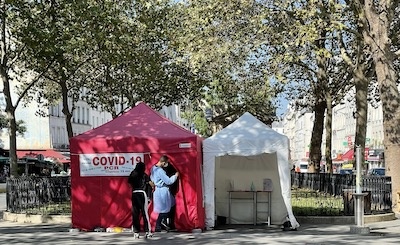
A vaccine card (or proof of a negative Covid test within 72 hours) was required at every.single.sit-down eating establishment, hotel, museum, or major tourist destination. Proof was not required to ride public transportation.
Surgical (not cloth) masks are required in every indoor space. Indoor mask-wearing was being strictly followed, with an occasional scofflaw in the subways. Compliance was certainly better than most places in the US. Almost all restaurants had outdoor patio seating available, though the desirability of this may change as the weather cools. Take-out businesses and park-bench dining were thriving. I did not see evidence that contact tracing (in restaurants) was happening. There are Covid testing tents in most busy squares, but many are not accessible to non-residents because they don’t have the ability to charge the required fee there. Covid testing (required for return to the US, and elsewhere) can be done in pharmacies and labs. Your hotel desk may help you find a location. Caution – our results did not arrive via text, as promised, probably because we didn’t have a French phone number. We ended up waiting in a very slow line at the lab to get the results.”

August 30, 2021 – Melissa Suzuno , U.S. visitor: “I’m spending a week in Paris in late August/early September 2021 and my trip is just for fun but as a freelance writer, I’m also doing some work here. I’m not sure if I’d really describe Parisians as “welcoming,” (haha) but tourism is alive and well in Paris. I did an Airbnb Experience and about half of the participants were French and half were American. The guide said that the number of Americans had decreased for a while but seems to be bouncing back. There are restrictions in place and they seem to be followed quite consistently. For example, you need to show your health pass (or recent negative COVID test) to eat in a restaurant (even outside) or enter a museum. Everywhere I’ve gone has enforced this. Local attractions like museums are open, but they recommend (and sometimes require) you to reserve your time in advance. I’ve gotten a few tests since I’ve been here (to get the temporary health pass). Tests are available in nearly any pharmacy and cost around 30 euros.”
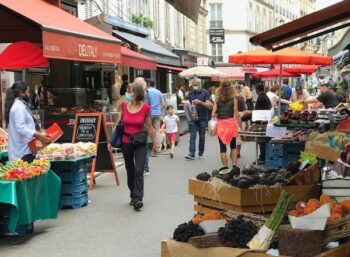
June 2021 – Leyla, Offbeat France , French resident: “I took a walking tour in the Marais a few days ago and we had one American tourist – the guide said it was her first of the season. Most tourists are French or European in Paris, but with the lockdown now lifted, a few Americans are beginning to arrive. In Paris, I’d say about 90% of people are following the rules. There is the occasional person who doesn’t cover their face in the subway or bus but they do get sideways looks from others. Everyone is masked in shops, because the owners will get fined otherwise. There’s usually plenty of gel at the door or at the cash register. In the streets, quite a few people still wear masks, considering that they are no longer mandatory. As the hot weather moves in, there will probably be fewer masks in the streets. The attached photo shows people do occasionally wear masks outdoors.”

June 2021 – Lena, Salut from Paris , French resident: “ Paris experienced a collective sigh in relief during the past weeks and enjoys the pure presence of normality – and travelers clearly belong to this normality. Just a couple of weeks ago, the obligation to wear masks outdoors got lifted. Indoors, it is still mandatory and the vast majority is complying. Food services and attractions are open again. However, while the online booking service of attractions assures that the number of visitors is not exceeded, I observe often that bars and restaurants are way fuller than they should be. It is recommended in France that everyone, locals and travelers, are downloading the app #tousanticovid for tracing and alerts. If a visitor requires a covid test, they can easily get tested in pharmacies.”
May 2021 – Audrey, French Resident in Lyon: “Since May 19, the curfew is now starting at 9:00 pm. Restaurants (only outdoor dining), boutiques, movie theatres, museums… have re-opened, only accepting half of the possible guests (which means you need to book everything or wait long lines on the sidewalk). Travel between regions is fully allowed before curfew and after if you’re filing an exemption form (if your train or flight arrives at 9:30 pm for example). All French people over 50 are being vaccinated. Our next milestones are the following: – May 31: opening of vaccination to everyone – June 9: opening of indoor dining and more people allowed in boutiques and such. Of course, wearing a mask is still mandatory everywhere public, inside and out.”
Planning a trip to Paris France?
Check out our other Paris, France travel resources: – Preparing for a Budget Trip to France – Where to Stay in Paris France: Best Neighborhoods Hotels Airbnbs – Travel Seasons: The Best Time to Visit Europe
If you have questions or updates about travel to Paris, France during the Coronavirus crisis or post-pandemic, please let us know in the comments below.
~ Pin this post for later or share with friends ~
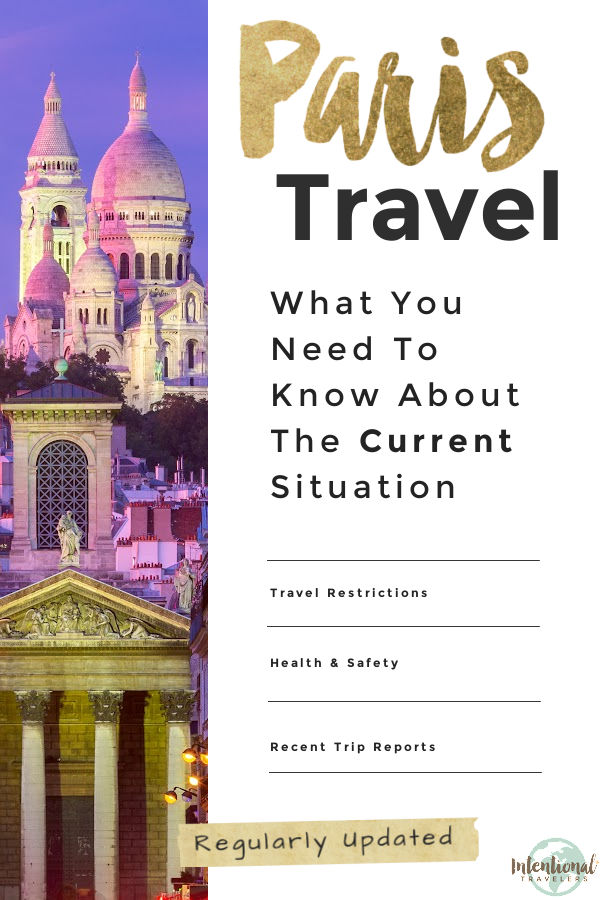
Disclaimer: Please note, travel restrictions change frequently. Readers must take responsibility for verifying information through official sources like the State Department and CDC, in respect to their specific situations. No responsibility can be accepted by Intentional Travelers for action or inaction as a result of information provided through IntentionalTravelers.com. Any information provided here is issued as general information only.
Similar Posts
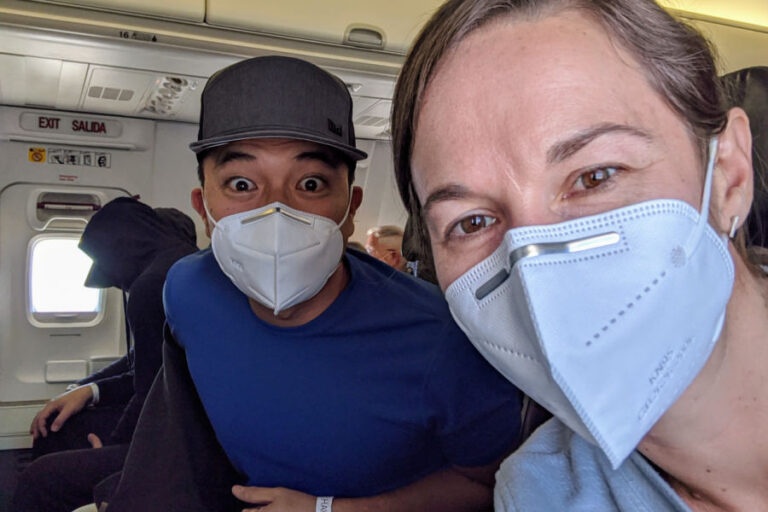
Should I reschedule my trip in 2022?
Should I cancel my 2022 trip? Should I reschedule my 2022 travel plans? Ever since we created our regularly-updated pandemic travel articles for certain destinations, I have received questions like these from readers again and again. In this post, I’ll share my answer – which applies regardless of the destination – as well as our…

Croatia travel requirements 2024: What travelers need to know
We aim to keep this post updated about Croatia travel in 2024 with official Croatia travel restrictions, requirements, and health and safety guidance. Our goal is to help you make informed decisions so you can travel confidently, safely, and responsibly in this new post-pandemic world of ours. We lived and worked from Croatia in winter…
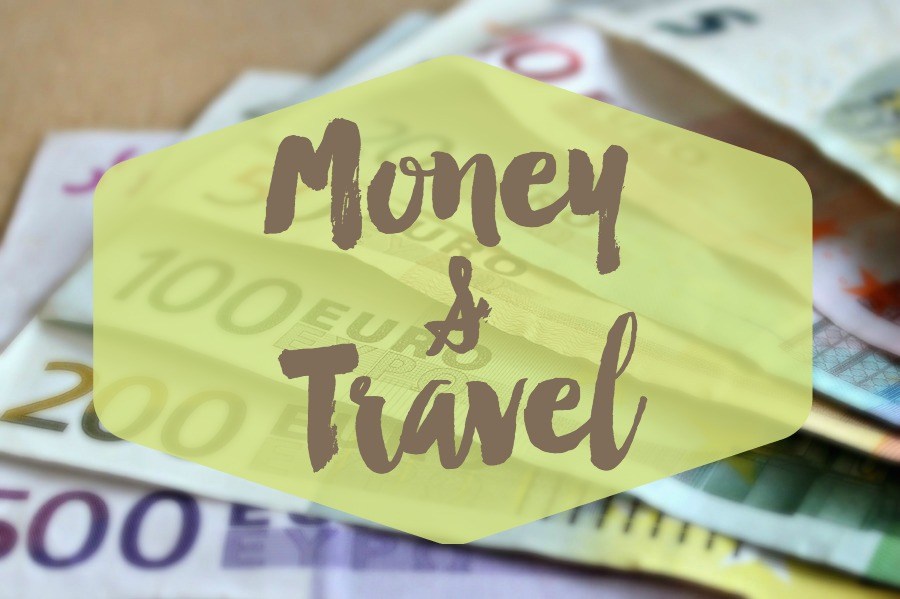
Unofficial Guide to Cash, Credit Cards, and ATMs for International Travel
How much money should I bring when I travel? Should I exchange currency before I go overseas? What’s the best way to carry cash when I’m abroad? What ATM cards or credit cards are best for international travel? In this post, we’ve put together our best tips for money and travel. Note: These tips are…

Cat Ba Island – Lan Ha – HaLong Bay Cruise Review + Tips
What is the best value for your money and time on a HaLong Bay cruise? These are our tips and full HaLong Bay cruise review to help you make the best choice. In this post, we share what we learned from our experience on Venezia Cruises 3-day 2-night Lan Ha Bay itinerary and from extensive research…

Our Favorite Alternatives to Travel Wallets
When it comes to exploring new destinations, we all want to be worry-free and secure. While traditional hidden travel wallets have been the go-to solution, we find they leave much to be desired. The discomfort of hanging wallets around our necks or dealing with bulky waist options led us to look for alternatives. In our…

Oregon travel requirements 2024: What travelers need to know
We aim to keep this post updated about Oregon travel in 2024 with official Oregon travel restrictions, requirements, and health and safety guidance. Our goal is to help you make informed decisions so you can travel confidently, safely, and responsibly in this new post-pandemic world of ours. We are Oregonians so this destination is very…
38 Comments
https://www.euronews.com/2022/03/03/covid-in-europe-france-to-scrap-face-masks-and-vaccine-passes-on-14-march
Looks like things may be loosening up by March 14th hopefully
Michelle, I have seen articles with Forbes, euro news & Reuters on the vaccine pass getting scrapped by March 14th in Paris except for in hospitals and on public transportation. Do you have any knowledge of this? Thanks Wendy
Hi Wendy! Thank you for visiting our blog. That information is correct. The French Government has recently announced that effective March 14, the vaccine pass will not be required to enter most businesses such as restaurants, bars, cafes, ski lifts, museums, cinemas and other cultural venues and theme parks. However, proof of vaccination will still be required in hospitals, retirement homes, and health centers.
I am a fully vaccinated/boosted American who will be arriving in Brest, France for one day, May 10, on a cruise ship followed with a one day stop in LeHavre, France on May 12. I’m aware of the French Vaccine Pass but can’t find anything about what is needed for a cruise ship arrival. Any help you can provide will be greatly appreciated.
Hi Susan. The French government does not specify restrictions for cruise ship passengers, therefore, the current entry rules for air travelers may also apply to travelers who want to go ashore in French ports. I understand that you are fully vaccinated/boosted, which is already compliant to France’s entry rules (you can find the details in our blog). Your cruise ship operator may also have information regarding entry rules to France. We will update our blog if the French government releases information regarding cruise ship arrivals. I hope this helps.
I just received this from Eurostar “You are considered fully vaccinated for travel purposes if you are aged 18 and over and: *you received a COVID-19 vaccine booster*
*you received the second dose of a two-dose vaccine at least a week ago, but no more than nine months ago*
So the important word here is “OR”. Sounds like it’s just what you said Michelle…thank you so much!!!
Thanks for following up, Debbi!
The new booster requirement is very confusing to me. I’ve read other articles where it says, if you don’t get a booster “within 9 months of original vaccine” then you’re considered unvaccinated.
I’m hoping you or someone you know can confirm this. My vaccination dates are as follows: Moderna – 4/5/2021 Moderna – 5/3/2021 Moderna Booster – 2/12/2022
Traveling at the end of March 2022 – As of now, will I be considered fully vaccinated and allowed to enter France? Or did I get the booster too late?
Thank you. Your article is very helpful!
Hi Katherine. We acknowledge that this requirement has been confusing. The way the official rule was translated in English makes it sound like the booster must be done *within* a certain timeframe. However, an expiration like this would be highly impractical and, in fact, most reporting on the requirement say more clearly: “Travelers aged 18 and over who had their full vaccine course over 9 months ago and have not since received a COVID-19 vaccine booster must follow the rules for unvaccinated passengers to enter France.” We have been researching this closely and have not seen any evidence of travelers being denied for a “late” booster, nor does France ever mention needing a second booster. We are keeping a close eye on this and will share any updates as they become available.
Thank you so much for your reply! I will keep a close eye on your page for any other updates.
Hello Michelle,
I am confused about the new protocol in France re: vaccinations and boosters. If I had my 2 vaccinations last Feb and March 2021 and then my booster 6 months later, am I considered “fully vaccinated”? Also, my adult son had his 2 vaccinations, the second being May 6th. He has not yet had his booster. I am reading that there is a 9 month expiration of his initial vaccinations so as of Feb 6 (3 days ago) he can no longer be considered “fully vaccinated” even if he gets his booster immediately?
Debbi, I hear you. This particular requirement can certainly be confusing, not to mention constantly changing. The way France has written the booster rule (“no later than nine months following the injection of the last required dose”) makes it sound like the booster must be done *within* 9 months of the second dose to enter France (or soon to be 4 months for the vaccine pass to enter restaurants). However, an expiration like this seems highly impractical and, in fact, most reporting on the requirement say more clearly: “Travelers aged 18 and over who had their full vaccine course over 9 months ago and have not since received a COVID-19 vaccine booster must follow the rules for unvaccinated passengers to enter France.” This would indicate that your son can be considered fully vaccinated once he gets a booster, even if the booster is done after 9 months. I’m assuming it’s just a translation/wording problem because I have not seen anywhere that travelers with “late” booster doses would lose any chance of being considered fully vaccinated. We are keeping a close eye on this and will share any updates as they become available.
Boosters every 4 months??! Wow
Yes, it seems to be the case. Like so many protocols, though, it could very well change.
I have a trip planned to Paris March 18,2022. I am reading that everyone needs to have the booster shot after being vaccinated for 4 months or you will not get the Vaccine Pass. Do you know if this rule is also mandatory for people going to France from the US? Some articles I have read say it is mandatory and others say it is not. Do you happen to know?
Thanks for your question Susie. I think part of the confusion is that the rules have changed recently. The following update is directly from the French government website in regards to foreigners vaccinated outside of France: “Since the 15th of January 2022, people aged 18 years and 1 month or more and who completed their initial vaccination scheme more than 7 months ago will need to present a proof of a booster dose to be eligible to receive a vaccine equivalency health pass.” I’m not sure why this site does not list the change to a 4 month rule that reportedly goes into effect in February. Perhaps confirmation is still forthcoming.
I am fully vaccinated. I had my booster in Dec. of 2021. I am going to France in June 2022, 6 months after my booster. Do I need a second booster in order to get in the country, or the receive the Health Certificate to allow me into restaurants and museums?
Hi Rebecca. We acknowledge that this requirement has been confusing. The way the official rule was translated in English makes it sound like the booster must be done *within* a certain timeframe. However, an expiration like this would be highly impractical and, in fact, most reporting on the requirement say more clearly: “Travelers aged 18 and over who had their full vaccine course over 9 months ago and have not since received a COVID-19 vaccine booster must follow the rules for unvaccinated passengers to enter France.” We have been researching this closely and have not seen any evidence of travelers being denied for a “late” booster, nor does France ever mention needing a second booster at this time. If you are boosted, you meet the current requirements to enter France and to receive the vaccine certificate. We are keeping a close eye on this and will share any updates as they become available.
I am wanting to plan a trip to take my 14 yr old daughter to Paris the last week of March 2022 on her spring break. I am fully vaccinated, but she is not. She has lab proof of antibodies – also sadly I’m being treated for a blood clot from my Covid vaccine which leads to my hesitation to vaccinate her. All of that aside- I see the paragraph that says travelers ages 11-17 are considered vaccinated if traveling with a fully vaccinated parent (I understand we would both need negative Covid test as well) I have read multiple other sites and I’ve seen this same info but have also seen on other sites everyone 12 & older must be vaccinated unless they’re going to quarantine for 10 days. Do you know what the policy is on this as we do not have 10 days to quarantine. IF she is able to come & not quarantine what would we do to get her a health pass or QR code to enter tourist sites? These are questions I cannot seem to clear up & I want to be sure before I would plan this. I am willing to email or call to France if I had the appropriate number and email contact. I’ve already sent an email a week ago through a government site and still do not have a response. Thank you in advance for any help/info you may have.
Thank you for visiting our blog. Current France travel rules states that “The measures applicable to fully vaccinated adults will be extended under the same conditions to minors accompanying them, regardless of vaccination status.” Since you are vaccinated, your 14-year-old daughter will be treated as vaccinated as well and will not need to quarantine. A negative test is however required for all travelers aged 12 and over. You can check the U.S. Embassy in France or the France Diplomacy websites for more information.
Regarding the health pass, persons age 12-15 require a health pass everywhere a vaccine pass is required. You can obtain a vaccine pass (or a health pass for your daughter) from designated pharmacies in France for a fee of up to 36 Euros (approximately 41.18 USD). You can check here for the map of designated pharmacies in France. You can check our blog for more information about the health pass and regular updates about France’s travel requirements. Hope this helps.
Thank you for your reply. As far as the health pass goes for my 14 yr old daughter, since she is not vaccinated am I understanding that in order for her to obtain one from the French pharmacies she will have to pass a Covid test every 24 hrs. for a fee of 36 euros each time to keep it active in order to be admitted into restaurants, museums, etc.? I have clicked on the map of pharmacies to actually check with one but everything on that page is in French. I am just making sure I understand this. Thank you
Wendy, an unvaccinated 14 year old would need a test within 24 hours in order to enter restaurants, attractions, and long-distance travel. She would not need to test daily unless you are visiting places where the pass is required each day. Antigen tests are 25 euros (36 was for the vaccine equivalent, sorry for the confusion). Here is a more direct link to pharmacy testing location map, you just have to keep clicking to zoom in on Paris: https://www.sante.fr/cf/carte-depistage-covid.html
Excellent information! Merci! It is January in the US right now and we are planning our trip to Paris for mid April 20 22 very excited but also so concerned because of the omicron variant now. I will follow your blog and see if any new postings are out as January comes to an end I am getting ready to book our trip now. Thanks again so much.
Great blog! Thanks for sharing paris travel restrictions, really helpful content.
I am planning a trip to Paris September 22 through 29th with a one day bus trip to Normandy. I understand that since I have a CDC proof of vaccination I do not need a test to enter France. However I do need a Travel Pass which would be obtained at a Pharmacy. I had read that the French government was paying for tests in order for tourists to return to their country of origin but not sure that is correct. My main question, does this process of receiving the Travel Pass work “smooth” or could there be snags. Same question for the required Covid-19 test upon returning, are there ample Pharmacy and testing sites for tourists? Has anyone taken a survey of recent travelers? Thank you
Thanks for visiting our blog. The French health pass for non-EU citizens is still relatively new and the protocols for visitors in September don’t seem to be fully established yet. Official guidance can be found here . At the moment, visitors coming before August 18 are able to submit their proof of vaccination by email before arrival to get the pass (a QR code). In case it’s not processed in time, getting tested in France is a temporary “back-up” method, valid for 72 hours. I’ve also seen that some travelers have been able to show their CDC vaccine card at a pharmacy in Paris to receive a QR code within 15 minutes, but I’m not sure how common that is yet. We will continue to seek out on-the-ground reports from recent travelers to find out how it’s going, and we’ll regularly update this post as we learn more.
We are scheduled to arrive Paris September 7, cruise to Normandy from the 9th through 16th, spend two more days in Paris, returning to U.S. on the 18th. The CDC and State Department alerts say “do not travel” and also warn about demonstrations and violence in tourist areas of major cities. We are in our 70s, fully vaccinated, but also cancer survivors. Should we cancel our trip?
I understand your concern. It’s a question I’ve been getting a lot lately with all the uncertainty around Europe travel so I wrote an article about it here: https://intentionaltravelers.com/should-i-reschedule-my-trip/ There is no right answer, as it depends on your values and risk tolerance, so I can’t really make that call for you. Demonstrations in Paris are certainly an additional factor to consider. But just to give some perspective… I’ve never been to Paris when there *wasn’t* a demonstration going by on my Uncle’s street, although they can vary in intensity. Usually protest locations are known so they can be avoided. However, if potentially dealing with that sounds too stressful, it may be a reason to cancel. Being fully vaccinated makes a huge difference but even so, cruising and travel in France during the pandemic is not without risk. Does the benefit of this trip outweigh that risk? Will worry get in the way of your enjoyment? That’s up to you.
Is there an app to use to show proof of vaccine status for visitors from outside the EU?
Thanks for your question. The E.U. vaccine app is only available to citizens and residents of the EU so far. Whether this will eventually be made available for non-EU tourists to facilitate travel in Europe is not yet clear, but we’ll be sure to update our blog posts here if that changes.
I am a US citizen planning a trip from USA to London and then to Paris. Is there any rules for US citizen traveling to Paris, via London by train?
Good question. Traveling through some countries to France can complicate the requirements. Whereas the U.S. is on the “green list”, the U.K. is on the “amber list” for France and the rules for the UK would apply since that’s where you’ll be departing from to enter France. Fully vaccinated travelers can enter France without an essential reason and would need to present a recent negative Covid test and proof of vaccination status. More details can be found here: https://www.diplomatie.gouv.fr/en/coming-to-france/coronavirus-advice-for-foreign-nationals-in-france/#sommaire_1
Hi Michelle,
It looks like France is no longer requiring a negative PCR test for vaccinated travelers from “Green” countries (the US included).
Or is it? Later on that page it states “(if you are aged 11 years or older) you agree to submit to a virological RT-PCR test for SARS-CoV-2 upon arrival in France.”
What are your thoughts?
Hi Ben. Thank you for visiting our blog. It is correct that France is no longer requiring a negative PCR test for fully vaccinated travelers from the United States and other Green countries. If a traveler (aged 11 years or older) from Green countries is not fully vaccinated, then a negative PCR or antigen test is required. A negative PCR or antigen test is also required for allowed travelers coming from “Orange” and “Red” countries.
A quick update from France: Since May 19, the curfew is now starting at 9:00 pm. Restaurants (only outdoor dining), boutiques, movie theatres, museums… have re-opened, only accepting half of the possible guests (which means you need to book everything or wait long lines on the sidewalk). Travel between regions is fully allowed before curfew and after if you’re filing an exemption form (if your train or flight arrives at 9:30 pm for example). All French people over 50 are being vaccinated. Our next milestones are the following: – May 31: opening of vaccination to everyone – June 9: opening of indoor dining and more people allowed in boutiques and such. Of course, wearing a mask is still mandatory everywhere public, inside and out.
Hi! Thanks so much for sharing these updates from France!
I have friends in Paris and I’m thinking about going next month…. Will the restrictions ease by then?
Hello and thank you for visiting our blog. I understand your concern about your trip next month, though we don’t have any special insight as to when protocols might change, beyond what we’ve already shared in the article. We will do our best to keep updating this post as the situation progresses.
Leave a Reply Cancel reply
Your email address will not be published. Required fields are marked *
This site uses Akismet to reduce spam. Learn how your comment data is processed .
- Search Please fill out this field.
- Manage Your Subscription
- Give a Gift Subscription
- Newsletters
- Sweepstakes
France Lifts All COVID-19 Restrictions for American Travelers — and Drops Mask Mandate
Start planning your trip to Paris.
:max_bytes(150000):strip_icc():format(webp)/alison-fox-author-pic-15f25761041b477aaf424ceca6618580.jpg)
France is easing border restrictions for American tourists, according to government officials, while simultaneously eliminating COVID-19-related vaccine mandates on the ground.
France re-classified the United States as a "green" country, allowing for easier entry protocols. Fully vaccinated travelers coming from a green country are allowed to enter by simply showing their proof of inoculation. Unvaccinated travelers are also welcome if they show proof of a negative COVID-19 PCR test taken within 72 hours of their departure or proof of a negative rapid antigen test taken within 48 hours of their departure.
Alternatively, travelers may show proof they contracted COVID-19 and recovered within six months of their trip.
Children under age 12 are exempt from all pre-entry testing requirements.
"The green list includes countries or territories with negligible or moderate virus circulation, in the absence of an emerging variant of concern," according to the French government's guidance .
The new rules come weeks after France eliminated the pre-departure testing requirement for vaccinated travelers . Before today, the country still required unvaccinated Americans to prove they had a compelling reason for their trip.
In addition to easing border restrictions, France suspended its vaccination pass and lifted mask rules on Monday, the country's Prime Minister Jean Castex tweeted . Previously, the pass was required to access public places like restaurants and cafes as well as long-distance trains.
Going forward, the country will only require face coverings be worn on public transportation.
The U.S. Centers for Disease Control and Prevention classifies France as a "Level 4" destination , indicating a "very high" level of COVID-19 transmission in the country and warning Americans to "avoid" traveling there. Currently, France is reporting more than 65,200 new infections on average each day, according to Reuters , but that is significantly lower than the country's peak in January.
France's decision to make it easier for tourists to enter comes as several countries in Europe ease or eliminate border restrictions. Both Ireland and Iceland , for example, have eliminated all COVID-19-related border restrictions, welcoming both vaccinated and unvaccinated travelers.
Alison Fox is a contributing writer for Travel + Leisure. When she's not in New York City, she likes to spend her time at the beach or exploring new destinations and hopes to visit every country in the world. Follow her adventures on Instagram .
Related Articles
Ministère de l'Intérieur et des outre-mer
- Paramètres d'affichage
COVID-19 : International travel

Mobilising on a weekly basis up to 6,000 members of the civil security service to carry out tests, border guards to check travellers’ health documents and internal security forces to oversee the isolation or quarantine measures decreed by the prefects, this mechanism was duly adjusted in response to the changing health conditions and Community regulations.
In light of the latest developments in the pandemic, the port health control system has been discontinued, pursuant to the law terminating the emergency measures instituted to combat the COVID-19 outbreak.
Accordingly, the rules previously applied to travellers to France no longer apply effective from 1 August 2022:
- Travellers are now exempt from any formalities prior to entry into France, be it in mainland France or overseas, and no longer required to present a health pass, regardless of the country or place of departure;
- Justification of travel (the “compelling reason”) is no longer required;
- Travellers are no longer required to present a sworn statement of non-contamination and an undertaking to undergo an antigen test or screening upon arrival in the country.
The same applies to travel between mainland France and each of the overseas territories. Similarly, the French authorities no longer require any justification for outgoing travel from France, be it from mainland France or overseas, or any exit clearance to travel to another country.
However, foreign countries may continue to apply specific entry measures and formalities.
As of February 16th 2023, all passengers traveling from China are no longer required to present a negative antigen or PCR test result dated less than 48 hours, or a sworn statement. Random screening on arrival is also discontinued.
It is still recommended to wear a single-use surgical mask on board the aircraft.
Passengers from China making a stopover in a different country to reach France are invited to check the conditions applicable to transits.
Click here to find out more about Overseas Territories Travel.
Suivez-nous sur nos réseaux sociaux
Paramètres d’affichage
Here are the latest rules for US visitors to Paris, France, plus tips on the best time of year to visit
- I f you're planning a trip to Paris, be aware of COVID-19 restrictions and local advisories.
- Keep reading for important details to know before you arrive in Paris.
- Visit Insider's hub for travel guides, tips, and recommendations .

Paris is easily one of the most popular destinations in the world. As of publishing, traveling to Paris and France from the US is possible, but knowing how to make your entry smooth and seamless before you arrive is essential.
I've made the trip myself and compiled the answers to common traveler questions below that you should consider before arriving in Paris, as well as tips regarding local weather and the best time of year to visit.
What are currently COVID-19 restrictions in Paris?
While COVID-19 travel protocols have shifted slightly over the past few months, one thing remains consistent: Vaccinated travel is the easiest option.
As of February 2022 , France has made it even easier for vaccinated travelers to visit the country by eliminating the need for a pre-arrival COVID-19 test. Instead, vaccinated travelers can simply arrive at the border with a valid passport and vaccination card.
Visitors are also required to fill out a sworn declaration that they are not experiencing COVID-19 symptoms or have had close contact with a confirmed case of COVID-19 prior to leaving for Paris.
Related stories
Non-vaccinated travelers are still required to present a negative pre-departure COVID-19 test, either a PCR test within 72 hours of departure or an antigen (rapid) test within the 48 hours prior to departure, as well as the aforementioned sworn statement. Quarantines are not necessary for vaccinated or unvaccinated travelers unless they test positive within seven days of arrival.
Regardless, make sure you dot the i's and cross the t's ahead of any travels because the website for the US Embassy in France says it requires individuals 18 years and older to have a booster shot of an mRNA vaccine if it's been 9 months or more since your second dose (or a single dose of the Johnson & Johnson vaccine) in order to be considered "fully vaccinated." If you're still within the 9 months, you may still qualify under the two-shot window as long as you were vaccinated at least seven days prior to your departure with a vaccine approved by the European Medicines Agency. Children over 12 must also be vaccinated with at least two doses, while children under 12 are currently exempt from being vaccinated.
Keep in mind that if you're arriving from a country other than the US, your entry requirements might differ. And as new variants continue, the French government may update these requirements. Read more here .
Masks are currently only mandatory on public transportation in France.
When is the best time to visit Paris?
Although the peak tourist season officially ends after summer, the fall is one of the most pleasant times to visit Paris. During the autumn season, temperatures range in the 60s, 70s, and sometimes 80s. Nights are consistently cooler, so you'll want to pack a light jacket to offset that transitional summer or early fall wardrobe.
You can also shop for one: Head to the Louvre and Tuileries district for luxe labels or to Marais for more low-key, vintage trends.
View Insider's comprehensive guide to visiting Paris.
- Main content
France Travel Restrictions
Traveler's COVID-19 vaccination status
Traveling from the United States to France
Open for vaccinated visitors
COVID-19 testing
Not required
Not required for vaccinated visitors
Restaurants
Not required in enclosed environments and public transportation.
France entry details and exceptions
Ready to travel, find flights to france, find stays in france, explore more countries on travel restrictions map, destinations you can travel to now, dominican republic, netherlands, philippines, puerto rico, switzerland, united arab emirates, united kingdom, know when to go.
Sign up for email alerts as countries begin to open - choose the destinations you're interested in so you're in the know.
Can I travel to France from the United States?
Most visitors from the United States, regardless of vaccination status, can enter France.
Can I travel to France if I am vaccinated?
Fully vaccinated visitors from the United States can enter France without restrictions.
Can I travel to France without being vaccinated?
Unvaccinated visitors from the United States can enter France without restrictions.
Do I need a COVID test to enter France?
Visitors from the United States are not required to present a negative COVID-19 PCR test or antigen result upon entering France.
Can I travel to France without quarantine?
Travelers from the United States are not required to quarantine.
Do I need to wear a mask in France?
Mask usage in France is not required in enclosed environments and public transportation.
Are the restaurants and bars open in France?
Restaurants in France are open. Bars in France are .
Jump to navigation

France lifts COVID restrictions for travelers
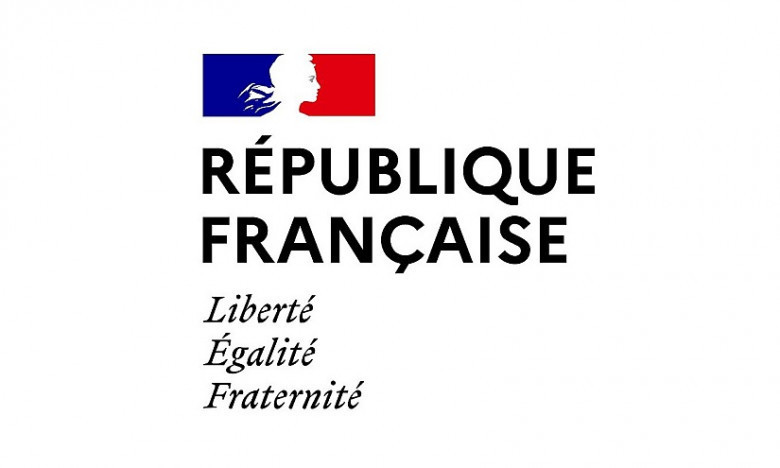
Following a new law voted July 30, 2022, the French parliament has declared an end to the public health emergency and subsequent exceptional measures put in place at the outset of the COVID pandemic. All COVID-19 restrictions applied to international travelers entering France have also been lifted.
As of August 1, 2022, the COVID-19 measures required for U.S. travelers and travellers from any other country to enter France and its Overseas Regions no longer apply:
• Travelers no longer have to complete any forms prior to their arrival in France, whether in mainland or Overseas France, Presentation of a health pass or proof of vaccination is no longer required, regardless of the country or area of origin;
• No further justification for travel (the "compelling reason") can be required;
• Travelers no longer have to provide a sworn statement of non-contamination and a commitment to undergo an antigenic test or biological examination upon arrival in the country.
The same applies to travel between mainland France and each of France’s Overseas Regions.
The law also states that if deemed necessary, the Government retains the option of activating "emergency brake" measures for a maximum of two months through January 31, 2023.
Travel and Covid-19: Answers to your questions
The entry, exit, and transit requirements for each country may differ greatly. We invite you to check all travel requirements (Covid-19 test, vaccines,...) for the countries through which you are due to transit directly on TravelDoc .

Check the type of test to be performed and its validity period

Check the approved vaccines and their validity requirements
What are the travel requirements for domestic flights within France and for flights to/from Corsica?
For all other destinations, please review the travel requirements for your flight on TravelDoc .
I have a connection in Metropolitan France. Do I need to be tested or vaccinated?
If you are traveling to or from an international destination and have a connection in Metropolitan France, you must meet the conditions imposed by your destination country.
Please check TravelDoc for the latest information regarding your travel requirements.
Where can I find real-time information on the latest travel requirements?
The TravelDoc website provides the latest information on travel requirements around the world. Visit TravelDoc
I am not vaccinated. Can I still travel?
If you are not vaccinated, please make sure to check the travel documents required for your trip on TravelDoc , as rules of entry and exit vary from country to country. For flight to/from France, no test or vaccine is required.
What is "Ready to Fly"?
The free and time-saving "Ready to Fly" service allows you to upload all the required health documents for your travel before you arrive at the airport. If your booking is eligible for this service, you will receive an e-mail prompting you to upload your documents to our online platform a few days before your scheduled flight. You can download or print your boarding pass with “Ready to Fly” printed on it after your documents have been checked and approved. You will receive a notification with instructions if you are missing a document or if a document is incomplete. Learn more .
Can I reschedule my flight if I test positive for Covid-19?
You can reschedule your flight if you test positive for Covid-19 in the days leading up to your trip if you get in touch with our customer service team before your scheduled departure date.
Covid-19 tests
When do i need to be tested to travel.
The validity period for Covid-19 tests is short: usually a few days before departure or arrival depending on the country. Visit TravelDoc to find out when to get tested before you travel. For more information on all domestic flights within France and flights to/from Corsica, please visit our FAQ on the health pass in France. Visit TravelDoc
How long is my test valid?
In most cases, the validity of a Covid-19 test is calculated based on:
- The time and date of collection
- The time and date of departure of the first flight of your trip.
However, exceptions are possible. Some countries calculate validity in days, not hours, or flight arrival rather than departure. Please visit TravelDoc to view the latest validity requirements for your trip.
Traveling on a connecting flight?
Please refer to the above information to calculate your test’s validity period. If different validity periods are required for each flight in your booking, the shortest validity period applies from the start of your trip. Visit TravelDoc
What type of Covid-19 test do I need for travel?
The type of Covid-19 test required varies by country. Visit TravelDoc to find out which test you will need to take before you travel. For more information on all domestic flights within France and flights to/from Corsica, please visit our FAQ on the health pass in France. Visit TravelDoc
Does my child need a Covid-19 test in order to travel? What are the age requirements?
Testing requirements for children depend on the destination country. Please consult TravelDoc to find out if your child needs to be tested for your trip. Visit TravelDoc
I've received my test result. What document do I need to show at the airport?
Some countries require a test certificate in digital or printed format, which may include a QR code. This certificate may be different from the result sent by your lab. Visit TravelDoc to verify which document to show at the airport. Visit TravelDoc
Does my test certificate need to be in a specific language?
Some countries accept a test certificate in English, others require it to be translated into the official language. See TravelDoc for more information. Visit TravelDoc
Vaccines against Covid-19
I have been vaccinated against covid-19. do i still need to get tested before i leave.
Some countries exempt vaccinated travelers from having to show a negative Covid-19 test. Check with TravelDoc to see if this applies to you. Remember to check the validity requirements, the type of vaccine allowed and the minimum time required between the last injection and entry into the country. Visit TravelDoc
I have been vaccinated against Covid-19. Do I still need to observe a quarantine upon arrival?
Some countries exempt vaccinated travelers from quarantine upon arrival. Check with TravelDoc to see if this applies to you. Be sure to check the validity requirements, the type of vaccine allowed and the minimum time required between the last injection and entry. Visit TravelDoc
What vaccines are authorized for travel?
Authorized vaccines vary from country to country, as do their validity conditions and the minimum time required between the last injection and entry into the country. In addition, some countries require all travelers, even those who have been vaccinated, to take a Covid-19 test or to observe a quarantine upon arrival. See TravelDoc for more information. Visit TravelDoc
France is open to Americans; Here's what it's like now and when to go

France reopened to international tourists , including vaccinated Americans, on Jun. 9, 2021. I covered the entry process last week and have been in France ever since, staying mostly in Paris.
I've gotten countless emails since publishing the entry article, most with one common theme: Is it worth visiting Paris right now? And the question makes sense since France has many coronavirus restrictions in place through the end of the month.
While I wish I could say that your Paris trip will look the same as in years past, that simply isn't the case. In fact, Paris isn't as open as many American cities like New York or Chicago . But, plenty of the city's charm is still there, and many of its strict lockdown measures have been eased.
Here, I'll discuss what you can do in Paris during the current phase of coronavirus restrictions.
Let's take a look!
For more TPG news delivered each morning to your inbox, sign up for our free daily newsletter .
Current COVID-19 restrictions in Paris
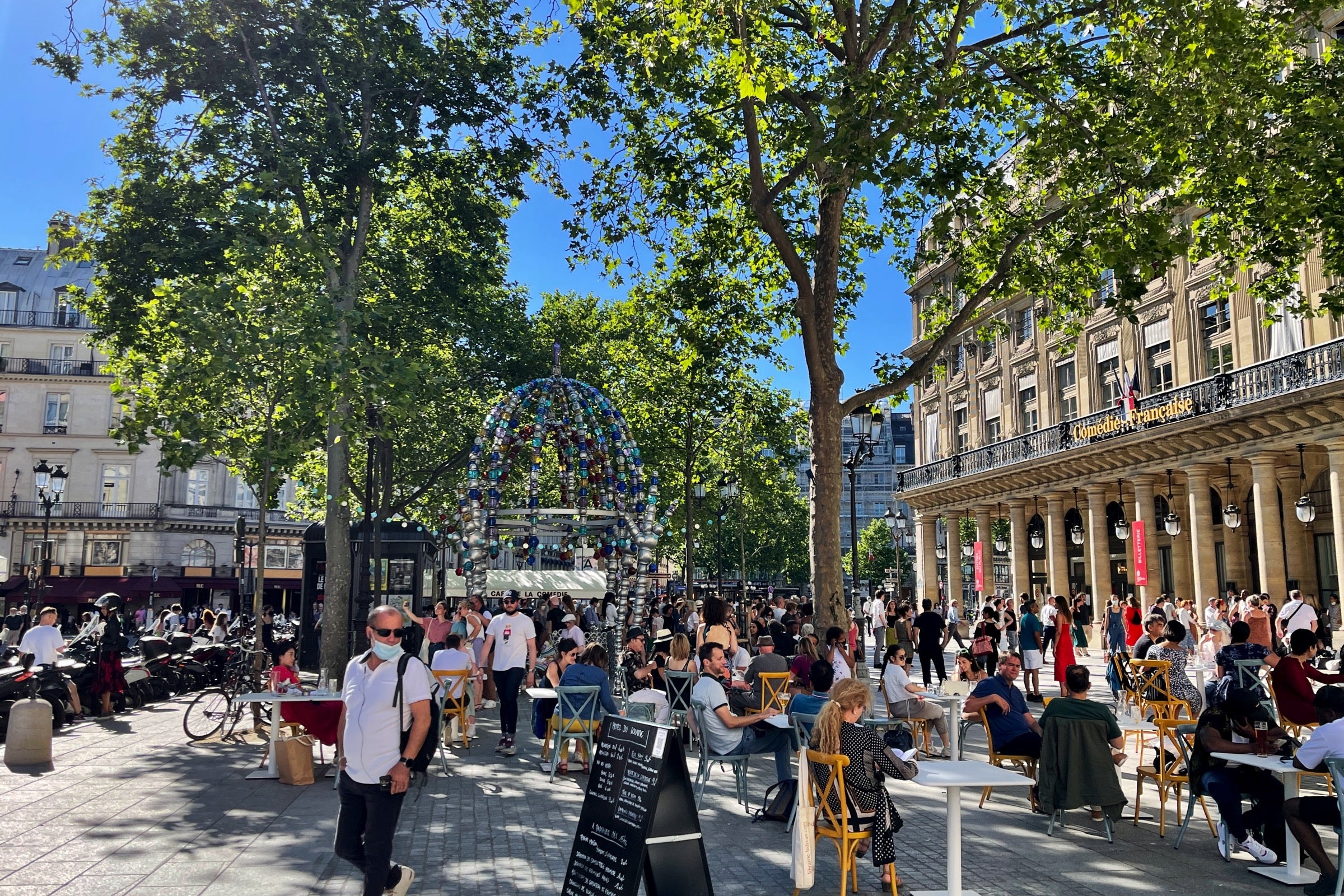
Let's start with the bad news: There are still some strict COVID-19 restrictions in effect in Paris (and France as a whole). Here's a closer look at what these restrictions are and how they can affect your Paris vacation.
There's an 11 p.m. curfew throughout France
One of the biggest drawbacks to visiting Paris (or France) right now is the 11 p.m. curfew. Everyone — including tourists — are required to be in their home or hotel room between 11 p.m. and 6 a.m. every day. There is a 135 euro fine for evading this curfew that's strictly enforced throughout Paris.
That said, don't fret if you have an early flight or train to catch. There are plenty of exceptions to the curfew and you can get an electronic exemption slip online.
Many restaurants in Paris are operating past 11 p.m. but without seating. You can order delivery from popular apps like Uber Eats and Deliveroo. Likewise, many hotels continue room service past the curfew, so you won't go hungry if you need dinner or want a midnight snack.
This curfew is expected to be lifted on June 20 if case counts continue to trend downward. So with that in mind, you might want to postpone your trip until next month if you're a night-owl.
Related: The 11 hotel breakfasts we'd order for every meal if we could
Most things operate at a reduced capacity
Now for the good news: Pretty much everything is open in Paris. That said, everything is open at a limited capacity, so you'll want to make reservations for restaurants and museums. Most museums have online reservations while restaurants usually require you to call in for a reservation, but I've had no issue walking into most cafes and bistros.
Related: 15 things to see and do on your first trip to Paris
You'll need a health pass for large events
The French government notes that a digital Health Pass is required for all large events in France. Generally, this is for events with more than 1,000 people. This includes open-air venues, theaters and stadiums, so you'll likely need this for concerts and sporting events when they restart.
You can download the TousAntiCOVID app from the App Store or Google Play to set up your pass. This pass shows vaccination status or a recent negative COVID test, but I haven't had any luck adding my CDC-issued vaccine card to the app yet. Thankfully I haven't needed a Health Pass thus far on the trip. If you need it for an event, you may need to get a negative COVID-19 test in France.
Related: Your guide to vaccine passports

Yes, masks are still required
Masks are still required in France. You must wear a mask at all indoor venues, including shops, cafes and restaurants. That said, you can take your mask off when eating or drinking. In practice, most locals aren't wearing masks once seated at any type of dining establishment.
Related: Masks still required during air travel as CDC loosens indoor mask guidelines for fully vaccinated people
Getting around Paris (and France)
Transportation in and around Paris (and France as a whole) is largely operating as normal. Here's my experience getting around the city.
The Paris Metro is running as normal

I've used the Paris Metro for the majority of my trips around town. It's operating as normal and on time. You'll find that many Metro cars are packed during peak times, so avoid rush hour if you're not into crowds. You can still purchase Metro tickets at all stations and take the RER train from Paris (CDG) to the city center.
Related: 10 things no one tells you about… Paris
National trains are still available

Headed to Nice, Bordeaux or another part of France after Paris? Don't fret — the SNCF is running trains all over the country. I took the train from Paris to Nice earlier this week and it was on time with zero issues. Just note that there are no blocked middle seats or other precautions taken, so you may want to rent a car or purchase a first-class ticket to avoid crowds.
Related: Tips for train travel and transportation in France
There's an Uber shortage, so download Bolt too
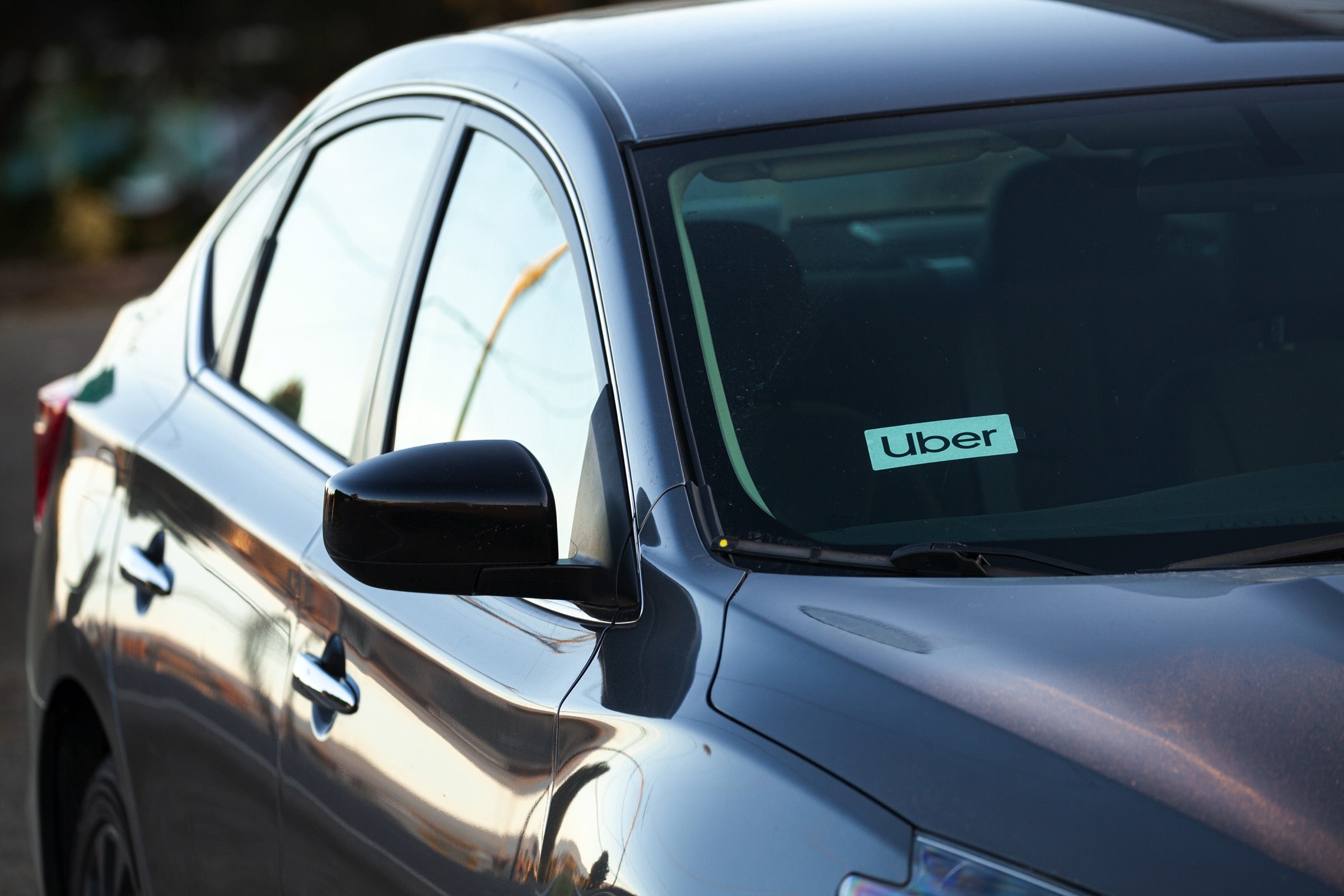
Like in many U.S. cities , there's an Uber shortage in Paris. Prices are high and it often takes 10+ minutes to find a ride if you're in the city center. I highly recommend downloading a European rideshare app like FreeNow or Bolt to use if you can't find an Uber. I've had good luck with Bolt and used it a couple of times during my trip.
Related: An Uber driver talks how to get the VIP treatment and be a better traveler in 2021
What you can do in Paris right now
Despite the restrictions, there is plenty to do in Paris. Here's a look at what you can do, see and eat in the French capital.
Restaurants, cafes, bars and bistros are open

Pretty much all dining establishments are open across Paris. They're allowed to be open at full capacity outdoors and half capacity indoors. Currently, bar seating is prohibited and there is a maximum of six guests per table.
I've noticed that all of these rules are under very limited enforcement, so your experience may vary depending on where you eat and drink. You'll find particularly large crowds at outdoor cafes on Friday nights after work. Midday crowds are about what they were pre-pandemic on cafe patios.
Related: 11 of the most Instagrammable cafés in Paris
Most museums are open, but you'll need a reservation
Museums are open, but with a capacity limit of one visitor per 4 square meters. You need to make a reservation for most museums on their website. I had no issue getting a ticket to the Louvre the weekend before my trip. That said, the Louvre had large crowds around premier exhibits like the Mona Lisa, but mask compliance was strictly enforced.
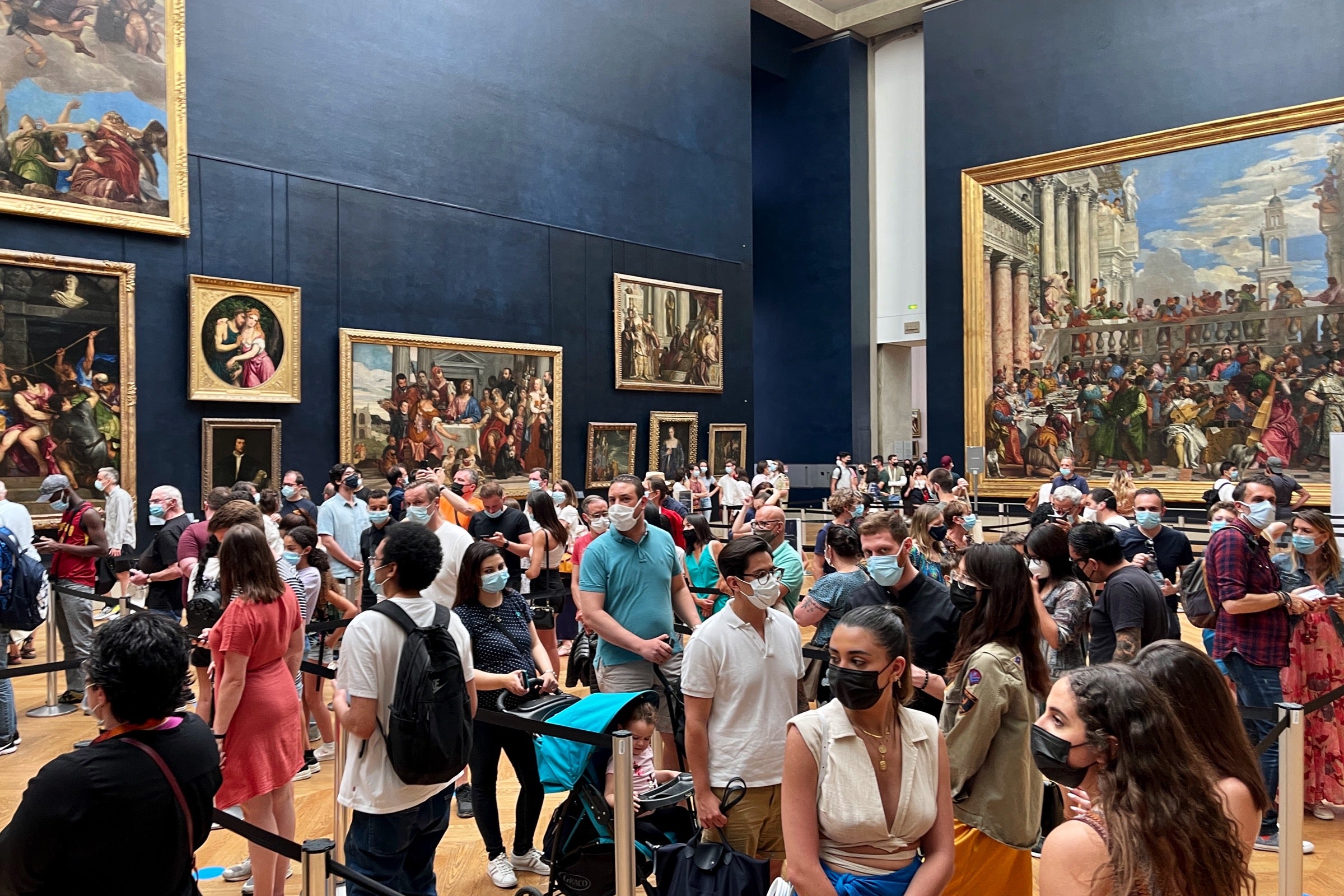
Unfortunately, some famous landmarks like Eiffel Tower remain closed until next month. You can still see them from the outside, but interior tours are still suspended. I'm hopeful that these will reopen on schedule so long as COVID-19 cases continue to trend downward in France.
Related: How to avoid soul-crushing crowds at the Louvre
Shops are operating as normal
Shops are operating as normal until the 11 p.m. curfew. This includes everything from designer clothes stores to the neighborhood grocery store. You'll have no problem getting your shopping fix in Paris.
Related: 8 hot shopping destinations in the world's most fashionable cities
The hotel experience is largely unchanged
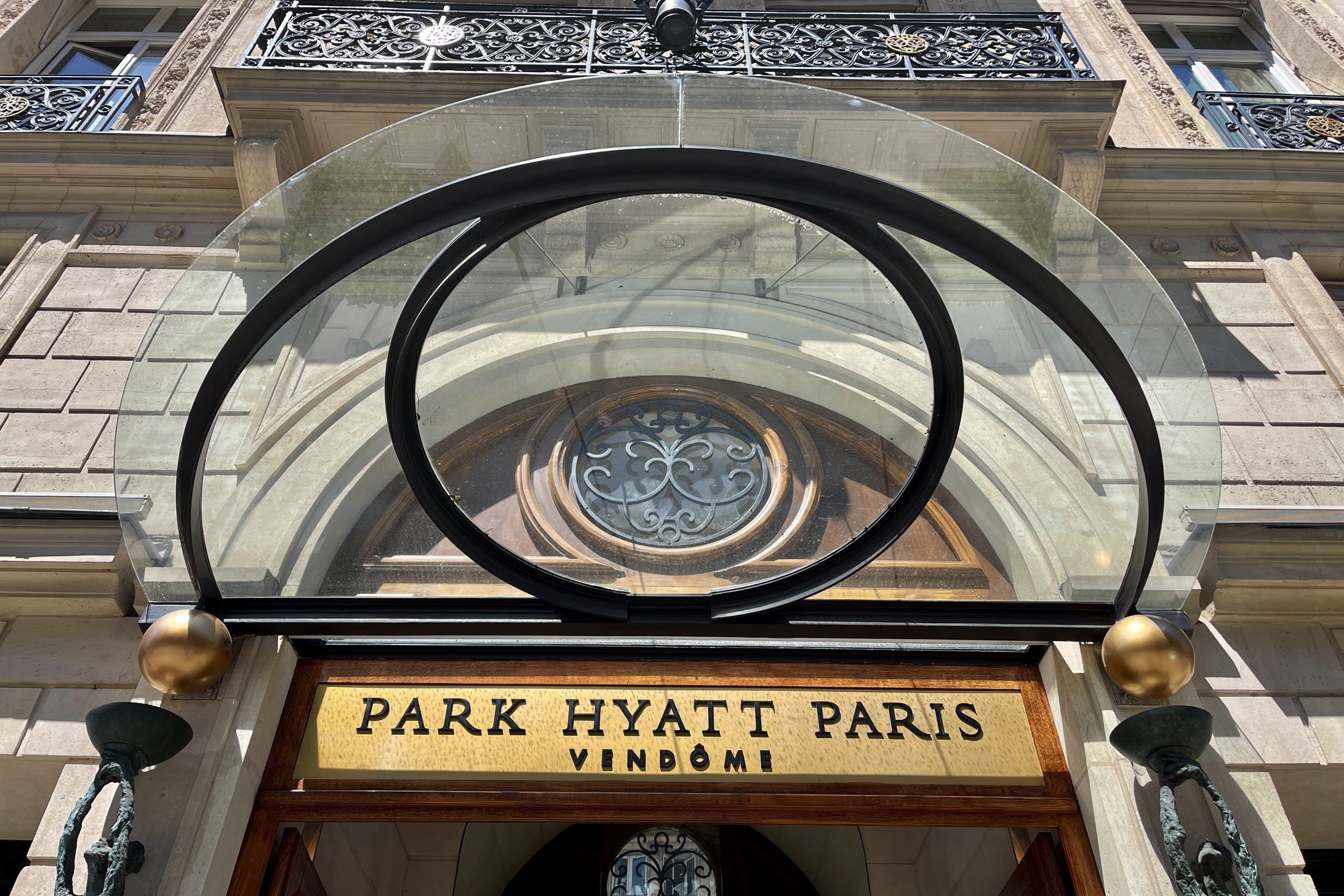
One thing that hasn't changed is the hotel experience in Paris. I stayed at three different hotels during my time in the city and each had open dining facilities, housekeeping and everything you'd expect from a pre-pandemic hotel experience. Just make sure to wear a mask in common areas.
Unlike Iceland , French hotels aren't requiring proof of vaccination at check-in. All you need to do is show your passport and credit card, as usual. This means check-in is quick and easy and you don't have to rustle through your bag to find other paperwork.
Don't worry — you'll hear more about my Paris hotel experiences in two upcoming reviews .
Related: 10 of the best points hotels in France
COVID-19 testing in Paris

Another thing readers have asked me is where they can get a COVID-19 test in Paris in order to return to the U.S. Truthfully, I'm writing this while still in France, so I haven't been tested for my return yet. But I've done a bit of research and have a good understanding of how to get a test in Paris.
Either a PCR or rapid antigen test are acceptable types of tests for return to the U.S. In my experience, these tests are checked at flight check-in and not at the U.S. border. Your test must be less than 72 hours old to be considered valid.
Antigen tests are relatively easy to come by in Paris. I saw a testing booth set up outside of the Operá Metro stop last week, so you may want to check if you're staying at a nearby hotel (like the Park Hyatt Paris-Vendôme ).
You can also find antigen testing at most pharmacies around Paris and other French cities. Pricing varies, but shouldn't be more than roughly 30 euros for foreigners not covered by French health insurance.
Further, there are testing centers at both Paris-Charles de Gaulle (CDG) and Paris-Orly (ORY) airports. These offer both PCR and antigen tests, with one- to two-hour turnarounds for antigen tests. You may consider getting to the airport early and getting a test before your flight if you can't find a test in town. Check the Paris airport website for more info. An antigen test at the airport costs 20 euros.
Related: Traveling soon? Here's where you can quickly get a COVID-19 PCR test for travel
Bottom line
Traveling to Paris right now gives you a unique opportunity to see the French capital with few tourists. At the same time, the curfew makes it limiting for night-owls. Personally, I'd wait a week and go once some of the remaining restrictions have been lifted.
At the same time, those who decide to make the trip now will have no shortage of things to do and see both in Paris and outside of the city. The Louvre and other famous museums are open and Paris' famous cafes and bistros are waiting to serve you an espresso (or a glass of wine).
Regardless of current restrictions, it's great to see life in the streets of Paris after months of lockdown. I thoroughly enjoyed my time in the city and am excited to return later this year as a part of a larger European itinerary.
Bon voyage!
Feature photo by Andrew Kunesh / The Points Guy
clock This article was published more than 1 year ago
Everything you need to know about traveling to France

This story has been updated.
Every 30 minutes, Le Petit Train de Montmartre departs for a guided tour of Paris ’s 18th arrondissement. Cars full of passengers taking photos of the passing sights — the Sacré-Coeur Basilica, the Moulin Rouge, the neighborhood’s other famous windmill, Moulin de la Galette — are a sign of tourism’s return to France.
Ever since American visitors were allowed entry to France again in early June 2021, demand has increased accordingly, bringing back customers the travel industry sorely missed.
“We’re so grateful, it’s a huge relief,” says Meg Zimbeck, the founder and editor in chief of the restaurant-review website and food tour company Paris by Mouth. After resuming tours in summer 2021, Zimbeck had to hire more tour guides to keep up with record-breaking bookings.
With the influx of travelers come busy museums and long lines, so “be prepared for high season,” Zimbeck says.
If you are planning a trip to France, here’s more advice from travel experts on what you need to know before you go.
9 questions about traveling to Europe, answered
What restrictions remain for travelers
On Aug. 1, France ended its pandemic-era entry requirements . Visitors no longer need to provide proof of vaccination or a negative coronavirus test, according to the U.S. Embassy in France.
France ended its vaccine pass requirement in March and no longer requires proof of testing or vaccination in establishments such as bars, restaurants, museums and event spaces.
Mask mandates have also ended, including for trains, planes, airports and subways. Masks are still recommended in small enclosed spaces, for vulnerable groups at large gatherings and in hospitals.
If you feel more comfortable with a face covering, “nobody bats an eye if you choose to wear a mask,” Zimbeck says. “There’s no anti-mask sentiment.”
The country does recommend that travelers download the TousAntiCovid , a contact-tracing app, for their visit.
Europe travel is complicated. Take these 7 tips from travelers who just went.
How to dine and explore
If you have your heart set on visiting particular restaurants, museums, transportation and live events, or staying in certain hotels, “start making those reservations as soon as possible,” says Kate Schwab, a spokesperson for the French tourism authority, Atout France.
Catherine Hodoul-Baudry, head of sales and marketing for the hotel Le Bristol Paris , says the property is seeing a “big, big comeback” of American guests, with even more booking interest than in 2019. The hotel’s three-Michelin-starred restaurant, Épicure, is booked solid for the next two months.
Zimbeck says that while it has always been helpful to make restaurant reservations at popular places ahead of time, that is particularly true now.
“The restaurants are very small, and the ones that are in demand are booked up weeks in advance,” she says.
A local’s guide to Paris
Zimbeck says many restaurants launched online reservation systems during the pandemic, making it easier than ever for foreigners to snag reservations ahead of their trip.
For transportation within France, Victoire Spoerry, travel adviser at the Virtuoso agency Wellness by LMSV , urges travelers to make reservations for their rental car or high-speed train tickets as soon as they secure their flight. The earlier you book, the cheaper the ticket or rate, plus you will have more options.
Where to get a coronavirus test before returning home
While the testing requirement to return to the United States has been dropped, you may still want to test as your trip to France comes to a close.
Schwab says you can expect to pay between 25 and 44 euros depending on the kind of test you get. If you would rather get tested at the airport before your flight, you may need to make an appointment , and the fee may be more expensive.
“You can go to the pharmacy and get them there,” Schwab says. “It’s pretty easy. … With the antigen [test], I got the results in 15 minutes.”
The U.S. Embassy in France also offers advice on finding a coronavirus test abroad.
More travel tips
Vacation planning: Start with a strategy to maximize days off by taking PTO around holidays. Experts recommend taking multiple short trips for peak happiness . Want to take an ambitious trip? Here are 12 destinations to try this year — without crowds.
Cheap flights: Follow our best advice for scoring low airfare , including setting flight price alerts and subscribing to deal newsletters. If you’re set on an expensive getaway, here’s a plan to save up without straining your credit limit.
Airport chaos: We’ve got advice for every scenario , from canceled flights to lost luggage . Stuck at the rental car counter? These tips can speed up the process. And following these 52 rules of flying should make the experience better for everyone.
Expert advice: Our By The Way Concierge solves readers’ dilemmas , including whether it’s okay to ditch a partner at security, or what happens if you get caught flying with weed . Submit your question here . Or you could look to the gurus: Lonely Planet and Rick Steves .

Update April 12, 2024
Information for u.s. citizens in the middle east.
- Travel Advisories |
- Contact Us |
- MyTravelGov |
Find U.S. Embassies & Consulates
Travel.state.gov, congressional liaison, special issuance agency, u.s. passports, international travel, intercountry adoption, international parental child abduction, records and authentications, popular links, travel advisories, mytravelgov, stay connected, legal resources, legal information, info for u.s. law enforcement, replace or certify documents.
Share this page:
France Travel Advisory
Travel advisory july 26, 2023, france - level 2: exercise increased caution.
Reissued with obsolete COVID-19 page links removed.
Exercise increased caution in France due to terrorism and civil unrest .
Country Summary: Terrorist groups continue plotting possible attacks in France. Terrorists may attack with little or no warning, targeting tourist locations, transportation hubs, markets/shopping malls, local government facilities, hotels, clubs, restaurants, places of worship, parks, major sporting and cultural events, educational institutions, airports, and other public areas.
Incidents such as pickpocketing and phone snatchings occur frequently and can happen anywhere, especially in crowded areas such as airports, train stations, subway and train cars, and near tourist attractions.
Peaceful demonstrations and strikes in Paris and other cities throughout France occur regularly and can disrupt transportation. On rare occasions, demonstrations have included violence and property damage and police have responded with water cannons and tear gas.
Read the country information page for additional information on travel to France.
If you decide to travel to France:
- Be aware of your surroundings when traveling to tourist locations and large crowded public venues.
- Avoid demonstrations and areas with significant police activity.
- Follow the instructions of local authorities including movement restrictions related to any ongoing police action.
- Find a safe location and shelter in place if unable to leave the vicinity of a demonstration.
- Monitor local media for breaking events and adjust your plans based on new information.
- Enroll in the Smart Traveler Enrollment Program ( STEP ) to receive Alerts and make it easier to locate you in an emergency.
- Follow the Department of State on Facebook and Twitter .
- Review the Country Security Report for France.
- Visit the CDC page for the latest Travel Health Information related to your travel.
- Prepare a contingency plan for emergency situations. Review the Traveler’s Checklist .
Travel Advisory Levels
Assistance for u.s. citizens, search for travel advisories, external link.
You are about to leave travel.state.gov for an external website that is not maintained by the U.S. Department of State.
Links to external websites are provided as a convenience and should not be construed as an endorsement by the U.S. Department of State of the views or products contained therein. If you wish to remain on travel.state.gov, click the "cancel" message.
You are about to visit:
Cookies on GOV.UK
We use some essential cookies to make this website work.
We’d like to set additional cookies to understand how you use GOV.UK, remember your settings and improve government services.
We also use cookies set by other sites to help us deliver content from their services.
You have accepted additional cookies. You can change your cookie settings at any time.
You have rejected additional cookies. You can change your cookie settings at any time.
- Passports, travel and living abroad
- Travel abroad
- Foreign travel advice
Entry requirements
This advice reflects the UK government’s understanding of current rules for people travelling on a full ‘British citizen’ passport from the UK, for the most common types of travel.
The authorities in France set and enforce entry rules. If you’re not sure how these requirements apply to you, contact France’s Embassy in the UK .
Countries may restrict travel or bring in rules at short notice. Check with your travel company or airline for changes.
Visit TravelHealthPro (from the UK’s National Travel Health Network and Centre) for general COVID-19 advice for travellers .
Public spaces
You’re strongly recommended to wear a face mask in health settings. In some areas, people aged 6 and above may need to wear a face mask.
Passport validity requirements
If you are planning to travel to an EU country (except Ireland), or Switzerland, Norway, Iceland, Liechtenstein, Andorra, Monaco, San Marino or Vatican City, follow the Schengen area passport requirements .
Your passport must be:
- issued less than 10 years before the date you enter the country (check the ‘date of issue’)
- valid for at least 3 months after the day you plan to leave (check the ‘expiry date’)
Check your passport meets these requirements before you travel. If your passport was issued before 1 October 2018, extra months may have been added to its expiry date.
Contact the French Embassy in the UK if you think that your passport does not meet both these requirements. Renew your passport if you need to .
Passport stamping
At French border control, you may need to:
- show proof of where you intend to stay, for example, a hotel booking or proof of address if visiting your own property
- show proof of insurance for your trip – check FCDO’s travel insurance guidance
- show a return or onward ticket
- prove that you have enough money for your whole stay
Check your passport is stamped if you enter or exit the Schengen area through France as a visitor. Border guards will use passport stamps to check you’re complying with the 90-day visa-free limit for short stays in the Schengen area. If relevant entry or exit stamps are not in your passport, border guards will presume that you have overstayed your visa-free limit.
You can show evidence of when and where you entered or exited the Schengen area, and ask the border guards to add this date and location in your passport. Examples of acceptable evidence include boarding passes and tickets.
If you live in France, read our Living in France guide for passport stamping information.
Proof of accommodation and funds
You may need to show proof of where you intend to stay. Read about documents you may need for short stays on the French government website . This will differ depending on where you are staying.
Staying with family, friends or a third party
You may be asked to provide an ‘attestation d’accueil’ (welcome invitation) from your host. The French resident hosting you must get the ‘attestation d’accueil’ from their local mayor’s office, and send the original ‘attestation’ before you enter France. Be prepared to show proof that you have at least €32.50 euros a day for the duration of your stay.
Second homes in France
You will need to be able to prove ownership or tenancy of your property, such as a tax or utility bill.
Staying in a hotel or other commercial accommodation
You may be asked for confirmation of your reservation when entering France. Be prepared to show proof that you have at least €65 euros a day for the duration of your stay.
Other circumstances
If you do not have an ‘attestation d’accueil’ (welcome invitation) or any pre-booked accommodation, you may be asked to prove you have at least €120 euros a day for the duration of your stay.
For more information on these requirements, visit the French government’s website on travel conditions for British citizens.
Visa requirements
You can travel to countries in the Schengen area, which France is part of, for up to 90 days in any 180-day period without a visa. This applies if you travel:
- as a tourist
- to visit family or friends
- to attend business meetings, cultural or sports events
- for short-term studies or training
If you are travelling to France and other Schengen countries without a visa, make sure your whole visit is within the 90-day limit. Visits to Schengen countries within the previous 180 days before you travel count towards your 90 days.
To stay longer (to work or study, for business travel or for other reasons), you will need to meet the French government’s entry requirements. Check which type of visa you may need on the France Visas website .
If you are travelling to France for work , read the guidance on visas and permits.
If you stay in France with a residence permit or long-stay visa, this does not count towards your 90-day visa-free limit.
British citizens who cannot return to the UK before their visa, permit or visa-free limit expires should contact their local prefecture in France .
Vaccination requirements (other than COVID-19)
At least 8 weeks before your trip, check the vaccinations and vaccination certificates you may need on TravelHealthPro.
Customs rules
There are strict rules about goods that can be brought into and taken out of France. Check the French Directorate General of Customs and Excise website . Declare anything that may be prohibited or subject to tax or duty.
Taking food and drink into the EU
You cannot take meat, milk or products containing them into EU countries. There are some exceptions for medical reasons, for example certain amounts of powdered infant milk, infant food, or pet food required for medical reasons. Check the rules about taking food and drink into the EU on the European Commission website.
Related content
Is this page useful.
- Yes this page is useful
- No this page is not useful
Help us improve GOV.UK
Don’t include personal or financial information like your National Insurance number or credit card details.
To help us improve GOV.UK, we’d like to know more about your visit today. We’ll send you a link to a feedback form. It will take only 2 minutes to fill in. Don’t worry we won’t send you spam or share your email address with anyone.
Middle East Crisis Trade and Diplomatic Moves Deepen Israel’s Isolation
- Share full article

Israel is under pressure to bring an end to the war in Gaza.
Turkey’s decision to suspend trade with Israel underscores the rising global pressure to wind down the war in Gaza, even as Israel’s leaders insist that they will not end the campaign until Hamas’s rule in the enclave has been eradicated.
Israel’s international isolation has mounted as its devastating military offensive in Gaza continues, with little end in sight. Some countries have downgraded or cut ties with Israel. Close partners like the United States, Britain and Germany , while remaining strongly supportive of Israel, have become more openly critical of its conduct and of restrictions on humanitarian aid to Gaza.
Colombia this week became the second South American nation to break off ties with Israel, after Bolivia. On the day that Bolivia made its announcement, Colombia and Chile both said that they were recalling their ambassadors to Israel, and Honduras followed suit within days. Belize also cut diplomatic ties with Israel that month.
Arab states like Jordan and Bahrain, with whom Israel cooperates closely on security, have also recalled their ambassadors amid public outcry over the rising death toll in Gaza. The Israeli offensive has also hampered U.S.-led efforts to forge an agreement to normalize diplomatic ties between Israel and Saudi Arabia, which Prime Minister Benjamin Netanyahu of Israel hoped would be a major part of his legacy.
The Biden administration, Israel’s most important ally, has shown no sign of pulling back military support, even as it warns against an Israeli invasion of Rafah, in southern Gaza, where more than a million people are sheltering. And Israel won a reprieve this week when a United Nations court declined to order Germany , Israel’s second-biggest supplier of weapons, after the United States, to suspend those arms sales.
Still, the moves by Turkey and others highlight how the war in Gaza, now nearly seven months old, is exacting a growing toll on Israel’s global standing.
Israel and Turkey had enjoyed a rapprochement in recent years. In 2022, the two countries announced that they would restore full diplomatic ties . They already were close trading partners, with Turkey sending roughly $4.6 billion in exports to Israel in 2023, according to Israeli government statistics.
Just a few weeks before Hamas’s attack against Israel on Oct. 7, Mr. Netanyahu and Turkey’s president, Recep Tayyip Erdogan, met for the first time, in New York during the United Nations General Assembly meeting. The two leaders agreed to visit each other’s countries, Mr. Netanyahu’s office said at the time.
Now, however, hopes for warmer relations appear to have been dashed. After the Hamas-led assault on Israel, Mr. Erdogan quickly took a strong rhetorical tack in favor of the Palestinian armed group, which he called “an organization of liberation”; he met with Hamas leaders in late April, drawing further Israeli ire.
On Friday, Mr. Erdogan said the decision to suspend trade was an attempt to pressure Israel into reaching a cease-fire with Hamas. Both Israel and mediators like Qatar, Egypt and the United States are still awaiting Hamas’s response to a truce proposal presented this week. U.S. officials, including William J. Burns, the C.I.A. chief, who was in Cairo on Friday for talks, have blamed Hamas for the failure to reach a deal.
“We have one single goal, to force the Netanyahu administration which got out of control with the West’s unconditional military and diplomatic support, to a cease-fire,” Mr. Erdogan said in an address in Ankara on Friday. “Once the cease-fire is announced and adequate humanitarian aid is allowed into Gaza, that goal would be reached.”
The decision to shut down imports and exports with Israel is highly unusual for Mr. Erdogan, who has generally allowed close economic ties to flourish in the shadow of high political tension, said Gallia Lindenstrauss, an expert on Turkey’s foreign policy at the Institute for National Security Studies think tank in Tel Aviv.
Mr. Erdogan likely hoped to leverage the issue to stave off growing domestic frustration with his two-decade-long rule, as opposition leaders won a string of municipalities during local elections earlier this year, Ms. Lindenstrauss said. But there was also an attempt “to exploit Israel’s weakness, and specifically Netanyahu’s weakness, to continue to weaken Israel and gain regional influence,” she added.
Many of Israel’s closer allies are now calling for a cease-fire and the release of hostages held by Palestinian armed groups in Gaza. In March, the U.N. Security Council passed a resolution calling for a cease-fire in the Gaza Strip during the Muslim holy month of Ramadan.
The war has also prompted renewed calls by some countries to recognize a Palestinian state, a move that is largely symbolic but strongly opposed by Mr. Netanyahu. Spain and Ireland, among other European nations, have said that they are working toward recognizing a state of Palestine.
Washington has long said that while it backs the eventual establishment of a Palestinian state, any recognition should come after negotiations between Israeli and Palestinian leaders.
The shifting tone reflects the war’s tremendous cost for Palestinians. Over the past seven months, the war has killed more than 34,000 people in Gaza, most of them women and children, according to local health officials. Israel’s offensive followed the Hamas-led attack on Oct. 7 that left about 1,200 dead and another 250 taken hostage, according to Israeli officials.
— Aaron Boxerman and Gulsin Harman
Turkey says it will suspend trade with Israel ‘until a permanent cease-fire.’
Turkey said late Thursday that it had halted all trade with Israel until “uninterrupted and adequate humanitarian aid is allowed into Gaza,” signaling further deterioration in relations between the two countries.
Turkey’s Trade Ministry said in a statement that exports and imports “for all products” would pause. On Friday, the trade minister, Omer Bolat, said that the suspension would remain in place until Israel’s bombardment of Gaza stops.
“Until a permanent cease-fire is established and uninterrupted humanitarian aid is allowed into Gaza, suspension of trade with Israel will be implemented for all imports and exports,” Mr. Bolat said at a news conference to announce monthly trade figures.
The move, which was initially reported by Bloomberg , prompted the Israeli foreign minister, Israel Katz, to lash out at Turkey’s president, Recep Tayyip Erdogan.
“This is how a dictator behaves, disregarding the interests of the Turkish people and businessmen, and ignoring international trade agreements,” Mr. Katz said in a post on social media . Mr. Katz added that he had instructed the Foreign Ministry to create alternatives to trading with Turkey, focusing on local production and imports from other countries.
Turkey reported $5.4 billion in exports to Israel in 2023 and $1.64 billion in imports, according to United Nations figures.
Mr. Erdogan did not comment publicly on any changes in Turkey’s trade ties with Israel. But the Turkish leader has strongly criticized Israel’s bombardment of Gaza, which began after Hamas led an Oct. 7 attack into Israel that killed about 1,200 people and led to the abduction of about 240 others. More than 34,000 Palestinians have been killed amid Israel’s bombardment of the territory, according to health officials in the territory.
The Turkish leader has also forcefully defended Hamas and recently met with Ismail Haniyeh, the group’s political leader, and other Hamas officials in Istanbul on April 20. Mr. Erdogan told reporters then, “Israel will certainly pay the price of the atrocities it has been inflicting on Palestinians one day.”
The decision by Turkey to halt trade came after its Trade Ministry imposed export restrictions on Israel on April 9 in 54 product groups, including cement and jet fuel, and said they would remain in force until “Israel declares an immediate cease-fire in Gaza.”
The Trade Ministry defined Thursday’s suspension as “the second step in intergovernmental measures” and cited “worsening humanitarian tragedy in Palestine.”
The Turkish foreign minister, Hakan Fidan, also announced on Wednesday that Turkey would join South Africa’s genocide case against Israel at the International Court of Justice. In a preliminary decision in January, the court ordered Israel to ensure that its forces were not committing genocide in Gaza.
— Gulsin Harman and Ben Hubbard reporting from Istanbul
Pro-Palestinian encampments spread to campuses in several countries.
Police remove dozens of protesters from sciences po university in paris, student demonstrators had been occupying a campus building in central paris, in protest over the war in gaza. french police cleared the building on friday..
Free Palestine. Free, free Palestine.

Pro-Palestinian students at one of France’s most elite universities, Sciences Po, occupied a campus building overnight. Like-minded demonstrators at University College London set up an encampment. And tents with Palestinian flags stretched out this week across university campuses in Australia.
The tensions gripping universities in the United States appear to be spreading to other countries, where student activists have challenged their own schools’ stances on the war in Gaza and ties to Israel.
Demonstrators at several universities in France have put pressure on administrators to more forcefully condemn Israel’s military offense in Gaza and review partnerships with Israeli universities and private donors.
Police officers went into Sciences Po on Friday morning to clear out a group of pro-Palestinian protesters who had occupied a campus building overnight and refused to leave until their demands were met, according to a statement from the university. The intervention came after a town hall debate about the Gaza war on Thursday at the university — which counts top politicians, civil servants and business leaders among its alumni — failed to defuse tensions.
The university said that students had breached an agreement not to disrupt classes and exams, and that it had made the “difficult decision” to involve the police after multiple attempts at dialogue failed. Several buildings were closed on Friday as a “security measure,” and a few dozen students were removed without violence, the statement said.
According to live video shared on Instagram, students sitting in a hall chanted, “We ask for justice! We get the police!” as officers pulled them out.
“For us, this is a movement of international scope,” Jack Espinose, 22, a student at Sciences Po who had occupied the building overnight, said in an interview. Later, he joined a protest of hundreds of students from other universities in front of the Panthéon in Paris. “We’re looking very closely at what’s happening in the United States, and we’d like to do the same thing in France,” he said.
In Britain, small encampments have begun to spring up at universities in the cities of Bristol, Newcastle and Warwick. And a coalition of students and staff members at University College London put up tents on the campus grounds on Thursday to pressure the school to divest from companies complicit in what they called “the genocide of Palestinians,” among other demands.
“We won’t move until the university meets our demands,” a spokesman identified only as Anwar said on Thursday in a social media post . The university did not immediately respond to a request for comment.
A union representing students at Trinity College Dublin said that the university had fined it more than 214,000 euros, about $230,000, for financial losses incurred because of disruptive protests since last September over the war in Gaza, rising student fees and other issues. The university, which is a nonprofit, in a statement cited the “negative financial impact” of protests blocking visitor access to the Book of Kells, a Medieval religious manuscript held at the university.
Laszlo Molnarfi, president of the students’ union at Trinity College, said in a phone interview that the union could not afford to pay the fine. He called it an attempt at intimidation by the university, adding that the protests would continue.
“We will be escalating,” he said. “The students in Columbia and in the U.S. are an absolute inspiration to all of us here."
In Australia, encampments have been set up at major universities in the cities of Adelaide, Canberra, Melbourne and Sydney. Those protests have grown more tense as pro-Israel demonstrators have gathered nearby.
Referring to the encampments, the Australasian Union of Jewish Students said in a social media post on Thursday, “We are deeply concerned that there will be further escalation in the vilification of Jewish students.”
University administrators in Australia have said that they support the students’ right to protest, while warning them to abide by school policies.
“It is naïve to think that students won’t be exercised by the same issues that are challenging broader society,” Vicki Thomson, chief executive for the Group of Eight, an organization representing Australia’s leading universities, told the Sydney Morning Herald.
Aurelien Breeden contributed reporting.
— Isabella Kwai and Ségolène Le Stradic reporting from London and Paris
A doctor from Gaza has died in Israeli detention after months in custody, Palestinian groups say.
A Palestinian doctor from the Gaza Strip, detained by Israeli forces and held for four months, has died in detention, Palestinian officials and detainee rights groups say.
Dr. Adnan Ahmad Albursh, 50, the head of orthopedics at Al-Shifa Hospital, the Gaza Strip’s biggest medical center, was detained along with other doctors in December by Israeli forces when they raided a hospital, according to the Palestinian Commission of Detainees’ Affairs and the Palestinian Prisoners Club, which advocate for the rights of Palestinian detainees held by Israel.
Israel’s military did not immediately respond to a request for comment. The Times of Israel cited the military as confirming that the Israeli prison service had declared Dr. Albursh dead on April 19, without giving a cause of death. It said he had been detained for national security reasons.
Israel has detained thousands of Palestinians from Gaza, including women and children. Former detainees have said that they suffered beatings and other physical abuse in Israeli custody, and the United Nations human rights office has said Israel’s treatment of detainees might amount to torture , which Israel denies. International human rights groups say they have been denied access to detainees.
Dozens of Palestinians have died in Israeli custody since Oct. 7, according to the Israeli military and rights groups. The Israeli military has said it is aware of the deaths of 27 Palestinians in its custody.
The prisoner rights groups accused Israel of abusing and killing Dr. Albursh, but did not offer evidence for their claims, or say how they knew about the circumstances of his confinement and death.
Dr. Albursh was detained while at Al Awda Hospital, where he fled after leaving Al Shifa, they said.
“He had a determination to continue treating his fellow countrymen,” said his nephew Khaled Albursh. “He could have left but he insisted on continuing to treat the wounded in the hospitals and even in the homes.”
Milena Ansari, the assistant researcher for Palestine for Human Rights Watch, said Dr. Albursh’s death raised grave concerns about the treatment of Palestinian detainees, and called for an independent investigation into the deaths of Palestinians in Israeli custody.
“This is not an isolated case,” she said, adding, “Those responsible for grave abuses should be prosecuted.”
The Israeli military has alleged that Hamas, the Palestinian political and armed group that took control of Gaza in 2007, built a command center in tunnels underneath Al-Shifa . Hamas and hospital administrators have rejected that claim.
Gaza’s medical system has come under sustained attack since Israel began its devastating bombing campaign and invasion of Gaza, in response to the Hamas-led attack in Israel on Oct. 7. Nearly 500 medical workers have been killed, the Palestinian Ministry of Health said.
The World Health Organization said that since Oct. 7, it has documented 443 attacks on health care facilities resulting in 723 fatalities.
On Dr. Albursh’s Facebook page, what appeared to be his last post appeared on Nov. 20.: “We will die standing and we will not kneel,” it said.
Rawan Sheikh Ahmad contributed reporting.
— Raja Abdulrahim
Two hostages, initially thought to be missing, are confirmed dead by the Israeli military.
Two Israeli men who were believed to have been taken hostage by Hamas fighters on Oct. 7 were actually killed during the attacks that day, according to Israeli authorities and relatives of the men.
One of the men, Dror Or, 49, was killed during a brutal assault on the Kibbutz Be’eri in which at least 97 people died, and the attackers took his body with them when they retreated back to Gaza, the kibbutz said in a statement released on Thursday.
The Israeli military announced that the remains of a second man who had been listed as a hostage, Elyakim Libman, had been found in Israeli territory after an investigation and forensic tests. He, too, was killed on Oct. 7, the military said.
Their cases are not isolated. The Israeli authorities have determined through investigation and forensic evidence that at least five other people who were initially thought to have been taken hostage were actually killed during the Oct. 7 Hamas-led attacks. In some cases, their bodies were taken and are still held in Gaza. At least three hostages were killed by the Israeli military during its ground operations in Gaza, and another was killed in a failed rescue mission.
Israeli authorities have said that about 250 people were taken, alive or dead, by Hamas and other armed groups and transported to Gaza. More than 100 have been returned, most of them during a weeklong autumn cease-fire. In February, Israeli authorities estimated that dozens of the remaining hostages inside Gaza were already dead, leaving as many as about 100 hostages still alive.
Many family members of hostages have become increasingly angry with how the Israeli government is handling the war, saying it should be doing more to secure a deal that would release their loved ones, even if that means toning down or halting the offensive against Hamas. Talks for a cease-fire deal have stalled for months; on Thursday, Hamas leaders hinted at progress and said they were reviewing Israel’s latest proposal.
Mr. Or’s brother, Elad Or, criticized the Israeli government for failing to stop the terrorist attacks on Oct. 7 and for not winning the release of the hostages.
“We need an immediate agreement!” he was quoted as saying in the kibbutz statement. “Enough with the foot-dragging and political games! Only an agreement can bring back the living hostages, crying to come home, and afterward, also return Dror’s body for burial in Israel.”
Mr. Or’s two children, Noam Or, 17, and his sister, Alma, 13, were also taken hostage. They were released from Gaza on Dec. 1. Their mother, Yonat, was killed in the Oct. 7 attacks.
Mr. Or’s nephew, Liam Or, 18, was also taken hostage at his home and released in November.
— Gaya Gupta
Iran says it has released the crew of an Israel-linked ship it detained last month.
Iran has released the crew of a container ship with links to Israel that it had detained last month , but is continuing to hold the vessel, the country’s foreign minister has said, according to Iranian media.
Iranian forces seized the Portuguese-flagged ship, the MSC Aries, as tensions between Iran and Israel were rising. Israel and the United States have condemned the seizure, with the U.S. National Security Council calling on Iran to release the vessel and its crew immediately.
The Iranian foreign minister, Hossein Amir Abdollahian, said that the crew had been released “with a humane approach” and that “it is possible for them to return” to their home countries, Tasnim News, a semiofficial news agency affiliated with the Islamic Revolutionary Guards Corps, reported on Thursday.
The ship itself is still “under judicial detention,” the agency quoted him as saying. Israel and the United States did not immediately comment.
The MSC Aries, a 1,200-foot cargo vessel, had 25 crew members on board, according to its operator. It is operated by MSC, a major shipping company, but belongs to an affiliate of Zodiac Maritime, which is part of the Zodiac Group, owned by the Israel-born billionaire Eyal Ofer.
At the time it was detained on April 13, MSC said the vessel had been boarded by “Iranian authorities” via helicopter as it passed the Strait of Hormuz. A video published by Iranian state news media showed a military helicopter hovering above what appeared to be the stern of the ship, with at least two soldiers descending by rope onto the deck.
The soldiers were part of the Revolutionary Guards, according to IRNA, the Iranian state news agency.
It was not the first time Iran had seized a commercial vessel. In January, Iran’s navy seized a tanker loaded with oil off the coast of Oman. In that seizure, soldiers also descended from a helicopter. Before the war in Gaza, the United States said that Iran had “harassed, attacked or interfered” with more than a dozen internationally flagged merchant ships in recent years.
— Leily Nikounazar and Christopher F. Schuetze
A U.N. report says rebuilding all the homes destroyed in Gaza could take 80 years.
Rebuilding all the homes destroyed by Israel’s military offensive in the Gaza Strip could take until the next century if the pace of reconstruction were to match what it was after wars there in 2014 and 2021, according to a United Nations report released on Thursday.
Citing data from the Palestinian Central Bureau of Statistics, the U.N. report said that as of April 15, some 370,000 homes in Gaza had been damaged, 79,000 of which have been destroyed. If those destroyed homes were rebuilt at the same pace as they were after the two previous wars — an average of 992 per year — it would take 80 years, according to projections in the report from the United Nations Development Program and the United Nations Economic and Social Commission for Western Asia.
The report detailed the war’s socioeconomic impact on the Palestinian population and said “the level of destruction in Gaza is such that the required assistance to rebuild would be on a scale not seen since 1948” to replace public infrastructure, including schools and hospitals.
The report said that even if Israel were to allow five times as much construction material into Gaza after this war as it did after the war in 2021 — “the most optimistic scenario” — rebuilding all of the destroyed homes would still take until 2040. That projection does not account for the time it would take to repair the hundreds of thousands of homes that were damaged but not destroyed.
The cost of rebuilding Gaza is increasing “exponentially” each day the fighting continues, Abdallah Al Dardari, the director of the U.N.D.P.’s regional bureau for Arab states, speaking over a video call from Amman, Jordan, said at a news conference on Thursday.
Mr. Al Dardari said that before “some sort of normalcy” can be established for Palestinians in Gaza, an estimated 37 million tons of debris must be cleared to allow for the construction of temporary shelters and, eventually, the rebuilding of homes.
The report also found that the unemployment rate for Palestinians across the occupied West Bank, East Jerusalem and Gaza surged to roughly 46 percent from about 26 percent after six months of war.
Over those six months, poverty rates in the Palestinian territories more than doubled, to an estimated 57.2 percent from 26.7 percent. That means 1.67 million Palestinians were pushed into poverty after the war began, the report said. Its estimates were based on a poverty line of $6.85 a day.
The effects of the war on Palestinians both in and out of Gaza “will be felt for years,” the report said.
— Anushka Patil
Hopes rise among relatives of hostages as signs of progress in talks are reported.
Dozens of family members of Israeli hostages and their supporters gathered in protest on Thursday opposite the Israeli military’s headquarters in Tel Aviv while the country’s war cabinet convened there to discuss, among other things, developments in talks aimed at securing the release of the captives.
The protesters blocked a sidewalk near the building where Israel’s top officials were meeting and, using loudspeakers, they counted to 209 — the number of days that had passed since the hostages were seized on Oct. 7. They called on Prime Minister Benjamin Netanyahu to agree to a deal that would secure the remaining hostages’ release, no matter how costly.
“Tension is very high,” said Shay Dickmann, the cousin of Carmel Gat, one of the hostages still in Gaza. “Whenever there’s talk about a deal our heart opens.”
Many of the relatives of hostages have staged similar demonstrations to Thursday’s in the months since their loved ones were taken captive. But in the last several days, they have experienced especially tense anticipation, clinging to reports indicating progress in the negotiations with Hamas.
But others in Israel — including right-wing lawmakers like Bezalel Smotrich, the country’s finance minister — have expressed disdain about the concessions the government would have to make to secure such a deal. Israel has recently said it would agree to the release of fewer hostages in exchange for a cease-fire and the release of Palestinian prisoners .
The proposal’s detractors have also raised concerns that a cease-fire would interfere with a planned ground incursion into Rafah, the southern Gaza city that Israel’s government maintains is the last stronghold of Hamas. Far-right members of Israel’s governing coalition have threatened to bring down Mr. Netanyahu’s administration if the war ends without Hamas’s total defeat.
Ms. Dickmann said she realized that the concessions Israel would have to make to reach a deal were difficult to accept but that they were “worth the lives that can still be saved.”
“I want to believe my country cares about my cousin’s life,” she said.
— Johnatan Reiss
Advertisement
- Go to the main menu
- Go to the mobile menu
- Go to main content
- Press Room Press Room

- Increase text size
- Decrease text size
- Add our RSS feed
Reopening France’s borders from 9 June (4 Jun. 2021)
- Share on Twitter
- Share on Facebook
- Partager sur Linkedin
Travel flows between France and foreign countries will re-open from 9 June according to terms contingent upon the health situation of these countries and the traveller’s vaccination status.
Asking the better questions that unlock new answers to the working world's most complex issues.
Trending topics
AI insights
EY Center for Board Matters
EY podcasts
EY webcasts
Operations leaders
Technology leaders
EY helps clients create long-term value for all stakeholders. Enabled by data and technology, our services and solutions provide trust through assurance and help clients transform, grow and operate.
EY.ai - A unifying platform
Strategy, transaction and transformation consulting
Technology transformation
Tax function operations
Climate change and sustainability services
EY Ecosystems
EY Nexus: business transformation platform
Discover how EY insights and services are helping to reframe the future of your industry.
Case studies
How Mojo Fertility is helping more men conceive
26-Sep-2023 Lisa Lindström
Strategy and Transactions
How a cosmetics giant’s transformation strategy is unlocking value
13-Sep-2023 Nobuko Kobayashi
How a global biopharma became a leader in ethical AI
15-Aug-2023 Catriona Campbell
We bring together extraordinary people, like you, to build a better working world.
Experienced professionals
EY-Parthenon careers
Student and entry level programs
Talent community
At EY, our purpose is building a better working world. The insights and services we provide help to create long-term value for clients, people and society, and to build trust in the capital markets.
Press release
Extreme E and EY publish Season 3 report, recording 8.2% carbon footprint reduction as female-male performance gap continues to narrow
09-Apr-2024 Michael Curtis
EY announces acceleration of client AI Business Model adoption with NVIDIA AI
20-Mar-2024 Barbara Dimajo
EY announces launch of artificial intelligence platform EY.ai following US$1.4b investment
13-Sep-2023 Rachel Lloyd
No results have been found
Recent Searches

How do you steady the course of your IPO journey in a changing landscape?
EY Global IPO Trends Q1 2024 provides insights, facts and figures on the IPO market and implications for companies planning to go public. Learn more.
How can the moments that threaten your transformation define its success?
Leaders that put humans at the center to navigate turning points are 12 times more likely to significantly improve transformation performance. Learn More.

Artificial Intelligence
EY.ai - a unifying platform
Select your location
close expand_more
Foreign direct investment in Europe declines for first time since pandemic
Press contact

EY Global Media Relations and Social Media Assistant Director – Talent, Diversity & Inclusion and Corporate Responsibility
- Send e-mail to Alasdair Gee
- Open X profile of Alasdair Gee
- Open LinkedIn profile of Alasdair Gee
Related topics
- European foreign direct investment (FDI) faces first decline in three years with number of projects down 4% and jobs down 7% in 2023
- France tops foreign investment league table but investment down 5%; UK bucks trend with 6% increase and moves up to second; Germany down to third after sharp 12% decline
- 72% of businesses plan to establish or expand operations in Europe over the next year, but risks remain
Foreign direct investment (FDI) into Europe declined in 2023, falling by 4% compared with 2022, and has dropped to 11% lower than in 2019, just before the COVID-19 pandemic hit, according to the annual EY European Attractiveness Survey 2024 – the most in-depth and long-running annual analysis of FDI into the continent.
France, the UK and Germany continue to attract the bulk of FDI and retain the top three spots, accounting for around half of total projects. FDI projects decreased by 5% (1,194 projects) in France and by 12% in Germany (733). The UK bucked the trend and moved ahead of Germany into second place with a 6% increase in the number of projects (985).
Despite hopes that FDI into Europe would bounce back post-pandemic, slow economic growth, spiraling inflation, soaring energy prices and a febrile geopolitical environment has caused the first downturn in European FDI since 2020.
Throughout 2023, businesses around the world announced 5,694 greenfield and expansion projects in 44 European countries, compared with 5,962 in 2022 – a year-on-year decrease of 4%, compared with 1% growth in 2022 and 5% growth in 2021. Investment is now 14% lower than its peak in 2017 and the total number of jobs created in Europe as a result of FDI fell 7% year on year to 319,923.
Companies cited increased regulatory burden, volatile energy prices and political instability as the top three risks impacting investment decisions. Europe has pioneered new regulatory initiatives on artificial intelligence (AI), sustainability and data protection and investors are worried these could stifle business growth. The ongoing energy crisis, uncertainty in the run-up to the European elections and rising social tensions and political radicalism are also concerning investors.
Julie Linn Teigland, EY EMEIA Area Managing Partner, says:
“Europe is in urgent need of foreign investment and this survey should serve as a wake-up call right across the continent. Policymakers must work together with businesses to create the conditions where investment can flourish and business thrives.
“Foreign investment builds the European economy by creating jobs, stimulating innovation and boosting exports. Despite the continued disappointing trajectory for investment in 2023, there are reasons to be optimistic about the longer term future. But urgent action must be taken now to help ensure Europe remains competitive in the face of increasingly stiff competition from the US and China.”
France stagnates, the UK rebounds and Germany falters
In line with the Europe-wide trend, investment in France fell by 5%. Despite this, the number of jobs created in France by FDI increased by 4%, underlining the ongoing benefits of business-friendly reforms and a comparatively healthy economy relative to other European countries.
The UK bucked Europe’s negative trend with a 6% increase in FDI projects in 2023. After a 2022 marked by political uncertainty, high inflation and rising energy prices, investors perceived something of a return to stability to UK markets last year, with foreign software and IT providers particularly loyal to London, which moved above Paris into the top spot as Europe’s #No. 1 investment region.
FDI in Germany decreased by 12% in 2023, continuing a steady decline since the onset of COVID-19. Industrial investors have been deterred by the recessionary environment, high energy prices and concerns about the security of energy supply. Complex bureaucracy and high labor costs also continue to limit Germany’s ability to attract more foreign businesses.
Reorganization of supply chains benefits Southern and Eastern Europe
Several countries in Southern and Eastern Europe benefitted significantly from businesses’ reorganization of supply chains and reshoring of production activities. The number of manufacturing projects decreased slightly across Europe, but increases were seen in Spain, Turkey, Poland, Italy, Serbia, the Czech Republic and Hungary. Slowing investment in the digital and business services sectors impacted investment in countries for which these areas are traditional strengths, such as the Netherlands and Belgium.
The war between Russia and Ukraine continues to impact investment in markets bordering either of those countries, including Romania (-13%), Finland (-32%) and the Baltic countries such as Latvia (-31%) and Lithuania (-40%).
FDI in services sectors declines but manufacturing proves resilient
The number of FDI projects in software and IT services and business and professional services — traditionally Europe’s largest sectors for investment — fell by 19% and 27%, respectively. Both are suffering from the effects of purse-tightening on the part of their clients and a general decline in outsourcing.
Investment in tourism and culture, in contrast, increased 130% in 2023. The sector continues to rebound as consumers return to spending on leisure and travel, free from pandemic-induced restrictions.
Investment in manufacturing remained relisient, declining by 1%. Businesses maintained manufacturing investment to ensure that they can meet consumer demand, which is expected to rise. Ongoing efforts to reorganize supply chains and relocate production bases to Europe also helped maintain manufacturing investment levels.
Optimism remains despite gloomy picture, but risks remain
Despite a gloomy overall picture, there is scope for optimism, as 72% of the businesses surveyed indicate plans to establish or expand operations in Europe over the next year – up from 67% in 2022 – a sign that Europe still matters in current and future business plans.
Investors are positive about Europe’s long-term prospects because the economic situation is expected to gradually improve. Moreover, in the context of rising geopolitical tension, the relative stability of Europe’s major economies is a considerable advantage.
However, leaders surveyed see the increased “regulatory burden” as the biggest threat to Europe's attractiveness over the next three years. Europe has pioneered new regulatory initiatives in areas including carbon disclosure, supply chain due diligence, data protection and the safe use of AI. Investors are worried that the expanding regulatory framework will stifle European business growth and agility. Reflecting concerns about the energy crisis of the past two years, “energy prices and supply issues” are considered the second biggest threat to Europe's attractiveness, with “political instability” in Europe ranked third. This is due to uncertainty in the run-up to the European elections and rising social tensions and political radicalism at local levels.
The full report can be accessed here .
Notes to editors
EY exists to build a better working world, helping to create long-term value for clients, people and society and build trust in the capital markets.
Enabled by data and technology, diverse EY teams in over 150 countries provide trust through assurance and help clients grow, transform and operate.
Working across assurance, consulting, law, strategy, tax and transactions, EY teams ask better questions to find new answers for the complex issues facing our world today.
EY refers to the global organization, and may refer to one or more, of the member firms of Ernst & Young Global Limited, each of which is a separate legal entity. Ernst & Young Global Limited, a UK company limited by guarantee, does not provide services to clients. Information about how EY collects and uses personal data and a description of the rights individuals have under data protection legislation is available via ey.com/privacy. For more information about our organization, please visit ey.com.
This news release has been issued by EYGM Limited, a member of the global EY organization that also does not provide any services to clients.
About the EY Europe Attractiveness Survey 2024
For this 23rd edition of the Europe Attractiveness Survey, we again draw on two sources.
- Our evaluation of FDI in Europe is based on the EY European Investment Monitor (EIM). This EY proprietary database enables us to track projects announced in 2023 across 44 countries.
- We explore Europe’s perceived attractiveness via an online survey of international decision-makers. Field research was conducted in February and March 2024 based on a representative panel of 500 respondents.
Related news

EY launches OpsChain Contract Manager solution to support secure private business agreements on public Ethereum
LONDON, April 17, 2024 – The EY organization today announces the launch of EY OpsChain Contract Manager (OCM), a transformative blockchain-enabled solution for contract management. EY OCM helps enterprises to execute complex business agreements, supporting confidentiality, helping improve time efficiency, and achieving cost reduction, with automatic adherence to the agreed terms.
EY and Saïd Business School study reveals that leaders prioritizing a human-centered approach to transformation turning points are up to 12x more successful
LONDON,16 April 2024. The EY organization’s latest research with Saïd Business School, at the University of Oxford, reveals new insights into what happens when a transformation program’s leadership believes a transformation has or will go off-course and intervenes with the intent of improving its performance (turning points).

LONDON, 9 APRIL 2024. Extreme E has published its third Sustainability Report, compiled, and produced in collaboration with EY. Continuing to race the series’ ODYSSEY 21 off-road electric vehicles and leveraging solar and green hydrogen energy, the report reveals that the racing series maintained its carbon-neutral status and reduced its overall carbon footprint by 8.2%.

Major shift in global IPO market share from the past five years
London, 28 March 2024. The year kicked off on a cautiously optimistic note, marked by a selective thaw following a quieter period. The Americas and EMEIA IPO markets had a bright start in 2024, increasing global proceeds. However, the Asia-Pacific region started on a weak note, weighing down the overall global volume.

EY announces 18 women entrepreneurs selected for the EY Entrepreneurial Winning Women™ Asia-Pacific class of 2024
HONG KONG, 27 MARCH 2024 — The EY organization today announces the details of 18 female entrepreneurs selected for the EY Entrepreneurial Winning Women™ Asia-Pacific class of 2024 — a bespoke executive program that identifies and champions a select group of high-potential entrepreneurs who have built profitable companies and provides them with connections and resources needed to unlock their potential and sustainably scale their companies.

LONDON, 20 March 2024. The EY organization today announces Ernst & Young LLP (EY US) will help clients implement and accelerate their artificial intelligence (AI) journeys using NVIDIA’s industry-leading technology and solutions.

- Connect with us
- Our locations
- Legal and privacy
- Open Facebook profile
- Open X profile
- Open LinkedIn profile
- Open Youtube profile
EY refers to the global organization, and may refer to one or more, of the member firms of Ernst & Young Global Limited, each of which is a separate legal entity. Ernst & Young Global Limited, a UK company limited by guarantee, does not provide services to clients.

IMAGES
COMMENTS
Paris, France travel restrictions currently allow traveling between regions. However, as of May 2023, short-haul domestic flights that can be taken by train in less than two-and-a-half hours are not allowed. ... Is a booster shot required for travel to Paris, France? As of August 2022, booster shots are no longer required for purposes of entry ...
Your Covid-19 questions answered. French people who are living abroad, travelling or returning from abroad, as well as visitors from abroad, will find answers below to frequently asked questions on COVID-19 measures. This FAQ supplements the information on the Conseils aux voyageurs (Travel advice, in French only) section.
Alison Fox. Published on March 14, 2022. France is easing border restrictions for American tourists, according to government officials, while simultaneously eliminating COVID-19-related vaccine ...
As of August 1, there are no Covid-19 related travel restrictions for France. This means travelers are no longer required to present proof of vaccination, complete a sworn statement before arrival ...
In light of the latest developments in the pandemic, the port health control system has been discontinued, pursuant to the law terminating the emergency measures instituted to combat the COVID-19 outbreak. Accordingly, the rules previously applied to travellers to France no longer apply effective from 1 August 2022: Travellers are now exempt ...
2 useful apps. In November 2021, Paris-Charles de Gaulle and Paris-Orly airports obtained AHA (Airport Health Accreditation) accreditation from the ACI (Airport Council International), an association bringing together most world airports. The audit conducted for this certification examined all health measures rolled out in our airports.
2022-05-18T16:53:05Z ... What are currently COVID-19 restrictions in Paris? While COVID-19 travel protocols have shifted slightly over the past few months, one thing remains consistent: Vaccinated ...
Latest news. COVID-19 - Q&A - (29 Nov. 2021) Q: Given the progression of the Omicron variant, are operations being considered to return French citizens to France from southern Africa? A: Given the situation created by the identification and spread of a new variant that the WHO has classified as a "variant of concern," and given the very (…)
For other travel restrictions, please check the guidance from your local authorities. COVID-19 testing. Quarantine. Ready to travel? Find flights to France. Find stays in France. Explore more countries on travel restrictions map Find out the entry rules for each country. Let's go.
This site is developed by Atout France, the national tourism operator under the supervision of the Ministry of Europe and Foreign Affairs. (Update: July 2023) With more than 90 million foreign visitors recorded in 2018 (including overseas destinations), France remains the world's leading tourist (…)
All COVID-19 restrictions applied to international travelers entering France have also been lifted. As of August 1, 2022, the COVID-19 measures required for U.S. travelers and travellers from any other country to enter France and its Overseas Regions no longer apply: • Travelers no longer have to complete any forms prior to their arrival in ...
The validity period for Covid-19 tests is short: usually a few days before departure or arrival depending on the country. Visit TravelDoc to find out when to get tested before you travel. For more information on all domestic flights within France and flights to/from Corsica, please visit our FAQ on the health pass in France.
Update as of 1 Aug 2022: France has lifted all travel restrictions related to COVID-19.. Excited to see the Eiffel Tower and The Louvre in Paris?Or perhaps you want to witness the lavender fields of Provence?We're all one step closer to realising our travel goals in France as it's welcoming tourists with very loose COVID-19 restrictions. Here are the France travel requirements you need to ...
Here's a closer look at what these restrictions are and how they can affect your Paris vacation. There's an 11 p.m. curfew throughout France. One of the biggest drawbacks to visiting Paris (or France) right now is the 11 p.m. curfew. Everyone — including tourists — are required to be in their home or hotel room between 11 p.m. and 6 a.m ...
August 3, 2022 at 12:34 p.m. EDT. (Washington Post illustration; iStock) 39. This story has been updated. Every 30 minutes, Le Petit Train de Montmartre departs for a guided tour of Paris 's ...
1 May 2024. Latest update: Removal of information on disruption to flights across France on 25 April ('Warnings and insurance' page). The Foreign, Commonwealth & Development Office (FCDO) provides ...
Peaceful demonstrations and strikes in Paris and other cities throughout France occur regularly and can disrupt transportation. On rare occasions, demonstrations have included violence and property damage and police have responded with water cannons and tear gas. Read the country information page for additional information on travel to France.
Your passport must be: issued less than 10 years before the date you enter the country (check the 'date of issue') valid for at least 3 months after the day you plan to leave (check the ...
07/05/2022 July 5, 2022. Anyone traveling in Europe must expect pandemic-related restrictions. Here are the current rules for France.
France has today eased strict COVID travel restrictions for arrivals from the United Kingdom. It means vaccinated travellers will no longer be required to self-isolate upon arrival.
The Council decided to prolong the restrictive measures targeting those responsible for undermining or threatening the territorial integrity, sovereignty and independence of Ukraine for another six months, until 15 September 2024. The existing restrictive measures provide for travel restrictions for natural persons, the freezing of assets, and a ban on making funds or other economic resources ...
Following the measures announced by the government on 29 January 2021: Travellers to or from a destination outside the European space. As of Sunday, 31 January 2021, all travel to France or from France to any country outside the European space (European Union Member States, Andorra, the Holy See, Iceland, Liechtenstein, Monaco, Norway, San Marino and Switzerland) will be denied, with the ...
In June 2022 the Council adopted a sixth package of sanctions that, among other things, prohibits the purchase, import or transfer of seaborne crude oil and certain petroleum products from Russia to the EU. The restrictions apply from 5 December 2022 for crude oil and from 5 February 2023 for other refined petroleum products.
The decision by Turkey to halt trade came after its Trade Ministry imposed export restrictions on Israel on April 9 in 54 product groups, including cement and jet fuel, and said they would remain ...
The measure comes on top of the travel restrictions which came into force at our borders on 18 March and will remain in place until 15 June 2020. The decrees implementing the Act of 11 May will be published and come into force on Saturday 23 May 2020. They create a legal framework which makes it possible to impose, by decision of the prefect ...
Reopening France's borders from 9 June (4 Jun. 2021) Travel flows between France and foreign countries will re-open from 9 June according to terms contingent upon the health situation of these countries and the traveller's vaccination status. Strategy for reopening the borders from 9 June - (PDF, 1 Mb)
LONDON, 2 MAY 2024. Foreign direct investment (FDI) into Europe declined in 2023, falling by 4% compared with 2022, and has dropped to 11% lower than in 2019, just before the COVID-19 pandemic hit, according to the annual EY European Attractiveness Survey 2024 - the most in-depth and long-running annual analysis of FDI into the continent.